#there’s a lot I don’t like about this version of Kirk but he’s certainly not boring
Explore tagged Tumblr posts
Text
Spread throughout the adaptation of The Corbomite Maneuver’s script are bits and pieces of how Jim sees his captaincy, and it’s fascinating.
Bones calls him out for pushing Lieutenant Bailey too hard, questioning whether Kirk made the decision to promote him based on facts or because he saw something of himself in the young crewman.
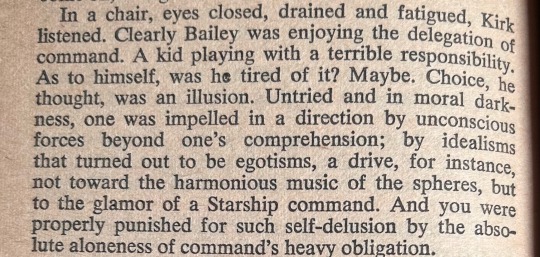
From this it sounds more like Kirk might be trying to squash out any illusions in Bailey about serving on a starship, let alone any aspirations towards command. The Naked Time has Kirk bemoaning his inability to fully exercise his desire to love and be loved, because the Enterprise and her crew are of paramount importance. There’s also that last sentence, suggesting Kirk races towards captaincy for the glamour, not fully appreciating what he’d have to give up in exchange.
That in itself is interesting because there isn’t really a strong case that he should have to make a sacrifice out of his personal life- there are members of the Enterprise crew who come from Starfleet families- and that Kirk is martyring himself. He could have those things but there’s still going to be a cost, and judging by the trail of good friends Kirk has left across Federation space, it’s not something he would willingly pay.

Perfection or nothing else because that’s what a Starship Captain demands, followed immediately by how tired he is, how burnt out. Is Kirk asking for perfection to exercise his frustration with the situation they’re in and his situation as captain or because being Perfect means that his personal martyrdom to the image of a Starship Captain makes the sacrifice worthwhile?
Kirk’s also somewhat dismissive and nearly resentful of the crew with the exception of Spock. During the countdown he is sharply aware that how he conducts himself affects the bridge crew, that awareness separates him from them, in his own thoughts putting him outside the community of the bridge crew. Kirk feels that, having seen him pull a rabbit out of his hat at the last minute to save them during previous crises, they’re now dependent on him to pull rabbit after rabbit out of his hat.
At one point he even has to smother his upset with Sulu, who is looking at him with awe. Kirk says he’s bored of excess awe and excess dependency.
The literal next sentence is that Spock isn’t prone to excessive awe or dependency, and Kirk notes that Spock never asks that Kirk pull a rabbit out of his hat. I think there’s some resentment associated with that perceived excess of awe and dependency (not just of Sulu but the whole crew), that he’s the one that always has to come up with the plans, be something more than human, be A Starship Captain.
I think it’s interesting that Spock is, to Kirk, set apart from the crew not only because of his role as First Officer but because he’s the only one who Kirk feels isn’t dependent on him. There’s equality between himself and Spock in a way that he needs desperately and can’t get with the way he’s set up: never breaking the Starship Captain persona for the rest of the crew, being married to the Enterprise (and a faithful husband). The crew can’t see him as a person, and he can’t give himself to any other person because that would be tantamount to adultery.
He loves the Enterprise as much as he resents her, and even though he feels trapped he can’t free himself.
#there’s a lot I don’t like about this version of Kirk but he’s certainly not boring#this man can fit so many fuckin problems inside#star trek tos#star trek novels#jim kirk#spock#the corbomite maneuver#james blish#star trek 12
21 notes
·
View notes
Text
Today I continued my Star Trek journey by rewatching Star Trek (2009) and boy howdy do I have some thoughts.
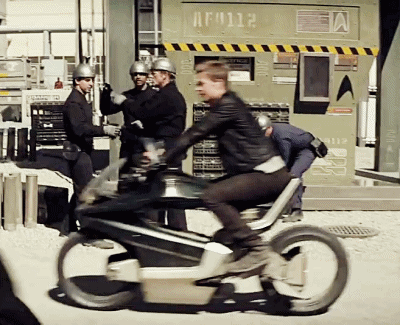
So first off, I saw this for the first time when I came out in 2009. It wasn’t my first experience with Star Trek, but it was probably my first with Kirk and Spock and that gang. I remember liking it a lot.
Now that I’ve watched all of TOS and a few of the movies with the original cast my feelings are a little more complicated.
Overall, fun movie! I imagine they had to have felt the weight of recasting and redoing such iconic characters, and in a lot of ways they succeeded. It certainly got younger people like me interested in the franchise!
💫 Spock: I do love this version of him. His “live long and prosper” to the VSA is perfectly bitchy and I’m obsessed with it.
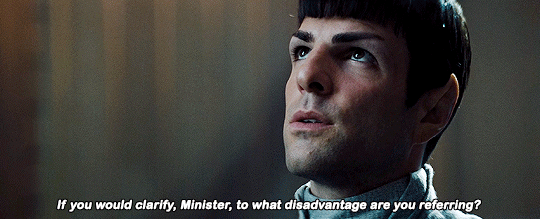
💫BONES!! if you’ve read any of my other posts you’ll know that somehow Bones snuck up on me as my favorite character. I love his intro here, and I think Karl Urban gets the tone just right. This really is a buffet for the McKirkers out there, I can see how this led to 1000 academy era fics of them.
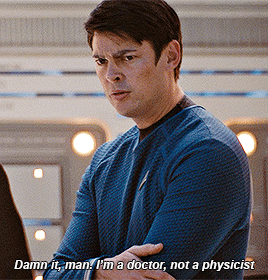
💫Kirk: oh Jim. Jimmy Jim Jim. Baby boy. What are you doing. How did being played by Chris Pine (who is incredibly hot) make you LESS attractive??
Obviously this Kirk suffers from some Kirk drift and the added trauma of losing his dad. He’s so much angrier, so much less sweet and nerdy. Rewatching this now I can see why I was so hesitant to like him in TOS because he’s a lot less lovable here.
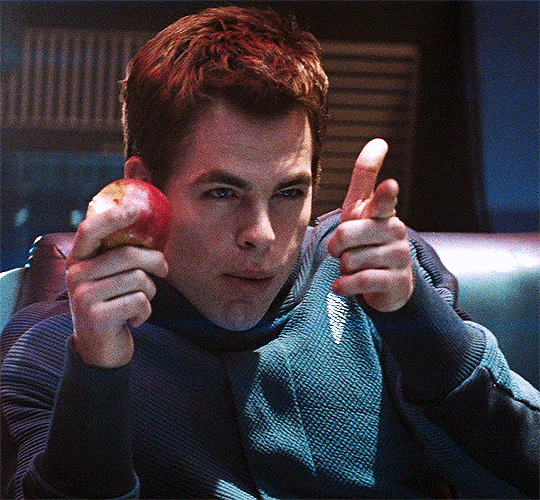
💫 I get it’s an emergency and they had to for plot reasons, but almost all of Pike’s staffing choices make no sense. Sure, Spock as acting captain, I get that. But everyone else?? Imagine being one of the other people there who has been with starfleet for years and seeing him hand Kirk the role of first officer. The ship can’t be entirely cadets can it?? Imagine the group texts going around after like “thank god he didn’t die because I really need to bitch about this.”
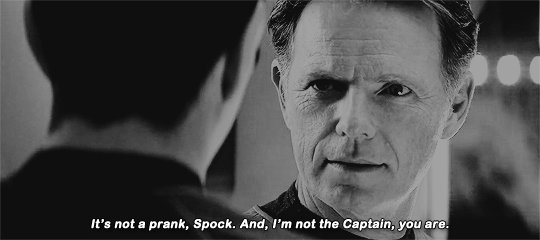
💫 I love all three Uhuras (tos, aos, and snw) and I get why they made her Spock’s love interest here because they’ve got fun chemistry! They have a lot in common, they’re both hot and smart, I get it. But cmon guys, that man is a 6 on the Kinsey scale. You keep pairing him with women and it doesn’t work.
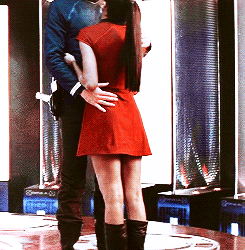
💫 I feel like they worked in lots of little references to classic trek, from plot stuff to smaller details like when Spock enters from the turbolift at the end in a very TMP way. I love that, it makes me feel like the people making the movie really care about the stories and the characters. When Spock Prime says good luck I felt all the weight of his relationship with his Jim and how it changed him. So lovely and touching.
And just how close they made Kirk and Spock stand, especially towards the end of the movie. They were always glued to each other in TOS and JJ must have known us Spirk shippers needed something to latch on to 😅
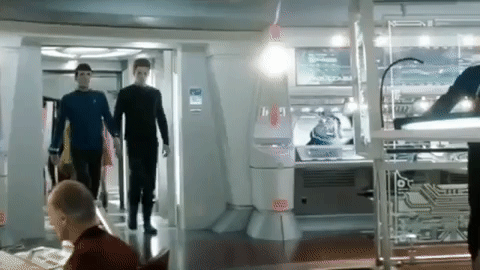
💫 There’s too much action in this movie for me. We didn’t need to see Scotty beamed into the water tank. The best sf stuff is always story based, I don’t need extravagant fights and cgi shit. I’m sure there are people who watch science fiction for the spectacle but I’m here for the ideas and the feelings.
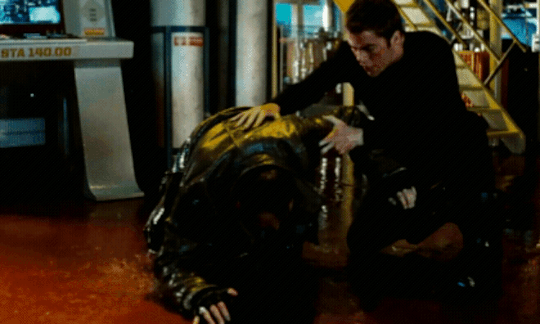
💫 goddddd everything with Vulcan and losing Amanda. Rip all our hearts out why don’t you. Spock’s mom dying is just heartbreaking. I know they had to lose someone we knew to make the destruction of the planet more real to us as viewers but so crushing to see it.
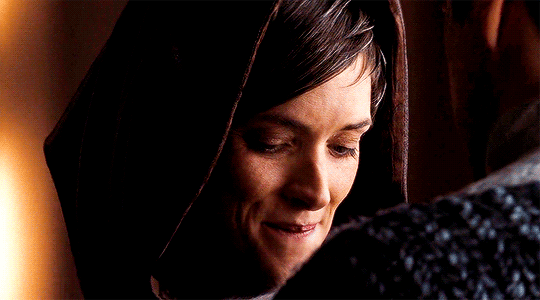
💫 Old Spock 😭😭😭
He knows right away who Jim is and expects that Jim found him on purpose.
Old Spock just launched right in to the mind meld huh. To me this really says that he and his Jim are on very casual mind meld terms and he’s not fully understanding that this Jim is not his Jim.
Think about how fucking weird all this must be for old Spock. How heartbreakingly strange it would be so see a young version of your husband and send him to a young version of yourself. Meeting all your old friends young selves, years after you’ve lost them all.
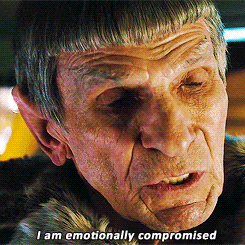
And from here out it’s just miscellaneous thoughts I jotted down while watching that don’t fit great anywhere else:
⭐️I love when the redshirt is so excited to get the Romulans and Kirk gets this look like… that’s why you’re here? Dude the battle not the appeal here. A nice glimpse of how this Kirk is similar at heart to TOS Kirk.
⭐️Love you Sulu and your fencing skills
⭐️I love when they stop the lift for emotional reasons.
⭐️“Our destinies have changed” goddddd great speech Spock
⭐️Jim has the look of a man who is frequently escorted places by security
⭐️Spock wants to break Kirk so bad 😂
⭐️When Jim slaps Spock’s back and Spock has a look of “I think that just awakened something in me.”
⭐️Spock you’re calling him Jim already? You slut. (Delighted, affectionate)
Overall I think it’s a fun movie but it misses a lot of what’s at the heart of the classic Trek I love. They try to do everything too fast and it just doesn’t work as well for me. I’m excited to rewatch the next two and see how these versions of the characters change!
#spirk#star trek#james t kirk#spock#leonard mccoy#star trek 2009#nyota uhura#not a bad movie!#but missing a lot of the vibes I love#I get why people love it and I get why people hate it.#mckirk
126 notes
·
View notes
Text
so I watched Star Trek II: The Wrath of Khan last night with my dad, and I keep thinking about something he said afterward
he said the Enterprise doesn’t have a real naval command structure, because everyone on the bridge is always waiting on the captain’s word before they act. when the engines come back on they have to wait for Kirk to tell them what to do. at that level, they should already know what they’re supposed to be doing, without having to be told.
and obviously this is partly because it’s a movie, and partly because by the midpoint of the story the Enterprise is so far beyond “normal” operations that they are kind of dependent on Kirk’s out-of-the-box decision making. but it got me thinking.
because the other thing my dad said was it’s kind of sad to see Kirk stuck in the past, trying to go back to a certain part of his life over and over again instead of moving forward. it’s weird that Bones encourages him to do that, because it’s not healthy.
(and my dad is a recently retired pilot, a guy who did have to leave a job he loved, and who’s moved on and found new passions in the last few years. he knows what he’s talking about.)
and it made me think of Kirk in a different light. it made me think of him as someone who found a job he was passionate about--captaining a starship--but never quite fit into that role in the way he was supposed to. and you can read that in a number of different ways, but Wrath of Khan specifically ties it to the Kobayashi Maru, to that iconic line, I don’t believe in no-win scenarios. once you realize how central that concept is to Kirk’s character, you start seeing it everywhere in the original series. Every other episode has some kind of no-win scenario, which Kirk and the gang of course find a way to circumvent because they’re just that good, and they don’t believe in no-win scenarios. it’s great! that’s one of the reasons I love TOS, because everything always works out in the end and it’s comforting. but it’s also a fantasy. and in Wrath of Khan, the fantasy runs out.
because Spock dies at the end (which really blindsided my sister, who also saw it with us). Jim goes running back to the only life he’s comfortable in, commanding a starship, and he loses his best friend for it. he fights as hard as he can to get out of the no-win scenario unscathed, but this time it doesn’t work. Wrath of Khan is, overall, a celebration of all the best parts of TOS, but I think there is a subtle line of criticism running underneath it. the opening scene of the film is Lt. Saavik (the love of my life) taking the Kobayashi Maru test, and failing. throughout the rest of the movie she keeps asking Jim about the test, about where she went wrong, about how he dealt with it when he was at the academy. and as the movie goes on we slowly learn more about the test, that Jim took it three times, and then we find that he solved it by cheating. what does that say about him, as a character?
I don’t believe in no-win scenarios.
I think there are two ways you can read that line.
Arrogance. Jim is willing to fight dirty to avoid failing at his goals.
Perseverance. Jim is unable to accept failure, not for his own sake, but for the sake of those around him.
personally I think both of these readings are supported by the text. Jim Kirk certainly loves his friends, cares about his crew, and would never sacrifice them for anything. (which is why Spock silently leaves the bridge and walks into the radiation chamber; he knows no one would ever ask him to sacrifice himself like that.) I think this is a heroic sentiment, the idea of I will not give up lives to solve this problem. but Jim also likes winning. he likes solving the problem and saving his ship and being a hero, and maybe that’s what ties him to the Enterprise more than anything. maybe that’s why he doesn’t know what to do with himself without it.
Jim Kirk’s greatest strength is the same as his fatal flaw: his inability to accept no-win scenarios. Wrath of Khan demonstrates this, maybe better than any other piece of TOS canon. and, further, I think Kirk’s characterization in Wrath of Khan is eerily close to his characterization in the AOS movies.
because the AOS movies fail at a lot of things, but they did manage to carry over this character trait--heck, Jim says his famous line in the first thirty minutes of the first movie. and it’s probably only there because it’s so iconic, because it’s something fans will recognize, but it carries some real weight even in this new story, because of the prologue and the death of George Kirk, which was a no-win scenario.
it’s like baby’s first explanation of the Kobayashi Maru--actually, the AOS movies in general are very much baby’s first Star Trek, which I think is a large part of why they’re mostly bad. but one thing they succeed at, one thing they actually do really well, is distill Jim Kirk down to a concentrated essence. AOS Jim Kirk is deeply arrogant and selfish, but he’s also ridiculously committed to his friends and crewmates. (often within minutes of meeting them! he threw himself off of an atmospheric drill rig for Sulu, a man he met maybe fifteen minutes prior.)
in Wrath of Khan, Jim tells Saavik that the Kobayashi Maru is an important experience because how we deal with death is just as important as how we deal with life. at the end of the movie, after Spock’s sacrifice, that line comes back to haunt him. I haven’t faced death, he says, I’ve cheated death. I've tricked my way out of death and patted myself on the back for my ingenuity. I know nothing.
it’s fitting, for this movie, this story, that Spock dies at the end. it forces Jim to confront death, confront failure, in a way he never has before. whether he’s avoided it out of trauma, arrogance, or something else is up to the viewer, but he has avoided it, and now he can’t. he’s finally faced the no-win scenario, and he has to learn to live with it.
I’ve never seen Star Trek: Into Darkness, and I may never see it (I’m still genuinely upset about what they did to Khan), but I think it is fitting that it’s Jim who dies at the end of that story. because the Jim Kirk of the Kelvin timeline is surrounded by death, practically born into a no-win scenario that would haunt him for the rest of his life. he may be arrogant, but he cares about the people around him more than anything. when faced with the classic Star Trek no-win scenario, he chooses to sacrifice himself. it’s not failure if everyone else makes it out, seems to be the idea, which is a kind of thinking that stems from trauma and extreme selflessness. it’s not necessarily healthy, but it’s the kind of decision this version of Jim Kirk would absolutely make.
Jim Kirk’s greatest strength is the same as his fatal flaw, and that’s what makes him such a great, enduring character. and Wrath of Khan is willing to explore Jim Kirk as a character in a way few other Star Trek stories did, and that’s what makes it such an enduring movie. it’s also really fun to watch. I had a great time, but it also made me think. it was a story, set in the fun, colorful Star Trek universe, about characterization and sacrifice and the nature of heroism.
50 notes
·
View notes
Text
Star Trek Doctors, Ranked By Crankiness
https://ift.tt/eA8V8J
This Star Trek: Lower Decks article contains spoilers for Season 2, Episode 3.
In the very first filmed episode of Star Trek: The Original Series — “The Cage” — Captain Pike drinks itty-bitty martinis with the Enterprise’s chief physician, Dr. Boyce (John Hoyt.) And although it remains to be seen if we’ll be seeing Boyce in Stranger New Worlds, the tradition of the cranky — but wise — Starfleet doctor was started right there. After Boyce and Piper, Star Trek set the standard for cranky, wise-cracking doctors in space with the introduction of Dr. Leonard “Bones” McCoy; as played by the wonderful DeForest Kelley.
While Kelley passed away in 1999, the spirit of Bones lives on. Not just in the Karl Urban version of Bones in the reboot films, but also in the foul-mouthed, utterly hilarious Catian medical officer, Dr. T’ana (Gillian Vigman) on Star Trek: Lower Decks. In the most recent episode of Lower Decks, “Mugato, Gumato,” T’ana demonstrated some next-level crankiness, as she avoided her own physical examination, something Bones had to prod Kirk to do all the time, including his first-ever filmed episode, “The Corbomite Maneuver.” But is Bones actually still the crankiest Star Trek doctor? Has T’ana dethroned him?
The only way to find out is to rank all the Trek doctors from least cranky to most cranky, and find out who is the hardest to please, and as a result, possibly the doctor we paradoxically love the most.
(Note: With some exceptions, we’ve excluded characters who were Starfleet doctors who weren’t regular recurring characters. This is why Dr. Selar from TNG isn’t on this list, even though as a Vulcan, she’s inherently cranky.)
10. Dr. Tracy Pollard (Discovery)
The least cranky doctor on this list is easily Dr. Pollard on Star Trek: Discovery. This woman even puts up with Georgiou, a dictator from an alternate universe who wants to die. As played by the fantastic Raven Daudu, it’s very possible Dr. Pollard is the best doctor on this list. She also may never be recognized as such, because she’s really even-tempered, kind and way too busy saving people’s lives to complain.
9. Dr. Phlox (Enterprise)
Phlox isn’t just one of the nicest Star Trek doctors ever, he’s actively one of the most likable characters in the entire franchise. Played charmingly by John Billingsley in all four seasons of Enterprise, Phlox projected a childlike curiosity of the universe combined with a ton of knowledge and wisdom of having seen more of the quadrant than most of the other characters. Phlox is also, perhaps, the most tolerant Star Trek doctor, insofar as he never pushes his cultural views onto others, even though, in some episodes, like “Dear, Doctor,” he’s torn apart by his own set of ethics. Oh, and he saved the life of Porthos, Captain Archer’s dog in “A Night in Skybay,” AND while doing so, managed to make a joke that Porthos would develop lizard-chameleon powers in the process. That’s bedside manner!
8. Dr. Hugh Culber (Discovery)
Who doesn’t love this guy? Since Season 1 of Discovery, Culber has put up with shit from everyone, and very rarely has he snapped. Yes, in Season 2, after coming back from the dead, he was pretty pissed off at everyone. But, as he said in Season 3, “My murderer and I are good now!” In episodes like “Su’kal” and “Die Trying,” Culber is one of the kindest and simultaneously most practical Star Trek doctors of all time. He doesn’t lie to anyone, but he does know how to make you feel better. Out of all the Discovery regulars, Culber feels cut from the same cloth as someone like Deanna Troi or Guinan. He’s smart, insightful and empathic.
7. Dr. Beverly Crusher (The Next Generation)
Crusher certainly has the ability to sass her patients, but she’s basically a nice person. Whenever Crusher freaks out on anyone it’s always because she’s either in love with a ghost that lives in a candle (“Sub Rosa”), her feelings are being manipulated by a nearby Vulcan (“Sarek”) or Jean-Luc is messing around with her emotions. (All of The Next Generation.) Crusher suffers the fools she works with, but she does it with grace and dignity. That said, you kind of know she hates certain people in certain moments, which can probably just be attributed to Gates McFadden’s flawless talent.
6. Emil, Rios’ EMH (Star Trek: Picard)
Rios has a lot of cranky holograms in Season 1 of Picard, but his medical hologram is not even close to being the most difficult of all of them. In fact, he’s pretty cordigal, and reasonable, which is odd considering the situation he’s in. Clearly, among the holograms on the La Sirena, Emil is one of the most well-adjusted. You wouldn’t want him as your primary physician in real life, and because he’s basically connected to the personality of Rios the possibility that he might become super cranky is certainly there. But, so far, he’s right on the line.
5. Dr. Julian Bashir (Deep Space Nine)
Okay, we’re crossing over into slightly cranky territory here. Bashir began his journey on DS9 as a cocky jerk, which isn’t the same as the kind of crankiness we’re talking about here. The Bones-style of crankiness is the kind of crank we can get down with. Bashir’s off-putting personality was — at first — not something anyone admired or liked. That said, as Alexander Siddig evolved the character, Bashir didn’t become more cranky, but he did develop righteous indignation. When Bashir got his indignant buzz on in episodes like “Past Tense,” or “Inter Arma Enim Silent Leges,” he was really at his best. To be clear, Bashir isn’t a nice doctor, and this is where we cross the threshold.
4. Dr. Leonard “Bones” McCoy (Star Trek: The Original Series)
Although he set the standard for crankiness, in the entire canon of Trek, Bones is somehow not the most cranky Star Trek doctor. The reasons for this are threefold: First, there are three characters on this list who are much crankiner than him. Second, Bones is actually a sweetheart deep down, and demonstrates his love for Spock over and over again, despite his terrible, terrible comments. Finally, Bones can’t be the crankiest doctor on this list because Dax heavily implied in “Trials and Tribble-ations,” that one of her previous hosts — Emony Dax — totally hooked-up with him. For some reason, this detail makes it seem like he’s a lot nicer than he comes across. And again, The Search for Spock exists.
3. Dr. Katherine Pulaski (The Next Generation)
In 1988, Pulaski would have easily been number one on this list. She mispronounces Data’s name, doesn’t feel bad about it, and proceeds to kind of make everyone else on the ship feel awful. Pulaski is a pretty good doctor, and not remotely a bad person, but she’s pretty damn cranky. The brilliant Diane Muldar plays Pulaski like someone who has been transferred to a job she doesn’t really want, which is sort of amazing considering at this point, Roddenberry didn’t want Starfleet characters to have interpersonal conflict.
In “The Icarus Factor ” (which the latest Lower Decks also referenced) Pulaski also thinks Riker’s deadbeat dad is hot and tells Riker this point blank when he’s reminding her that his dad is the worst. This alone gives her deeply strange tastes, and makes her super cranky and weird AF. Don’t mess with Pulaksi! If you talk about how your friend is mean, she might throw it in your face and say she likes them better than you anyway!
2. Dr. T’ana (Lower Decks)
Okay. So Dr. T’ana is almost the most cranky Star Trek doctor ever. Combining the best qualities of Bones, with that weird go-shove-it-vibe from Pulaksi, Gillian Vigman turns it all up to 11. It helps that T’ana is a cat-person (I.E. the Catian species) but her crankiness is more than that. She’s kind of sadistic, and isn’t afraid to use boulders to knock “strange energies” out of people when the time comes. T’ana is sort of burnt-out, but also, is kind of unflappable too. Like, you get the sense that she’s sick of all this space sickness stuff, but she’s got too much proffensionality to say she can’t do something. The secret crankiness of Dr. T’ana is that seemingly she can fix anything that is wrong with anyone. But, she’s going to make fun of them for it, and get pissed off if you look at her the wrong way.
That said, like Bones, you get the sense that none of it is personal. Which is what makes her Starfleet all the way.
1. The EMH (Voyager)
Robert Picardo’s Emergency Medical Hologram is the best cranky Star Trek doctor. There are many reasons for this. His arrogance. His constant complaining. The fact that he has good reason to complain, considering he’s a hologram that has to do other people’s bidding. But the reason that tops all other reasons is the way that Picardo can make his crankiness clear with the simple inflection of his voice. It’s not what he says. It’s how he says it. And if you need proof, all you have to do is go back to the very first Voyager episode ever, “Caretaker.” When the Doctor has to start triage on the wounded crew, he asks somebody to hand him a tricorder. He looks at it, and realizes it’s not the right kind of tricorder, and hands it back and says “medical tricorder.” The amount of venom in this comment cannot be communicated in print. The way Picardo says medical tricorder is so dismissive and frustrated, that he basically created a new level of crankiness with one single utterance.
T’ana may be creeping up the EMH from behind, but this cranky crown will be hard to swipe. Especially from a hologram.
cnx.cmd.push(function() { cnx({ playerId: "106e33c0-3911-473c-b599-b1426db57530", }).render("0270c398a82f44f49c23c16122516796"); });
Lower Decks airs new episodes on Thursdays on Paramount+.
The post Star Trek Doctors, Ranked By Crankiness appeared first on Den of Geek.
from Den of Geek https://ift.tt/3DID5RI
6 notes
·
View notes
Note
I’ve read Waid and Hickman’s FF runs and am currently reading Zdarsky’s 2 in One. I’m planning on eventually reading the Lee/Kirby run. Can I ask, what other runs would you recommend? Is Claremont’s good? Sorry for bothering.
I LOVE Waid and Hickman’s Fantastic Four runs, and Zdarsky’s Marvel Two-In-One was excellent to the point where one of my lingering disappointments is that Marvel brought the Fantastic Four back in a way that prematurely cut off Zdarksy’s 2n1. I know I said I wanted them back but wow did we all get monkey’s paw’d on that one. Zdarsky did really excellent stuff with both Ben and Johnny and the multiverse hopping was honestly fun and interesting. Lee/Kirby is also, in my opinion, just a really terrific run -- it lays the groundwork for not only the future of the Fantastic Four but a lot of big concepts for the Marvel Universe in general, and I think it holds up really well by modern day storytelling standards. Lee’s sense of humor works well with the retrofuturistic vibe and Kirby’s art is always wonderful. In particular I think it’s interesting to look back on The Galactus Trilogy (Fantastic Four #48-50) as the granddaddy of all event comics, for better or worse.
Claremont -- okay, I love Claremont’s run, let me start off by saying that. Claremont’s run follows on what is in my opinion one of the worst periods of Fantastic Four canon, and I mean bad to the point where the literal canon at that point was that to get things back on track the Fantastic Four had to be put in a bubble universe. Claremont’s run kicks in one or two issues after their return to the main Marvel universe and it’s so fun. I think Fantastic Four is one of those series that kind of flourishes in adversity and Claremont’s run starts off with the Fantastic Four trying to regain their footing in a world that had assumed them dead, their Baxter Building gone, living in a warehouse property. Claremont, in my opinion, also has one of the best if not the best handle on characterization for a lot of key Fantastic Four figures, including Johnny, Reed, and Sue. His Ben is also very good, but I think Ben in particular tends to be an easier sell for a lot of comic book writers -- the outcast, the gruff man, the comic relief. He’s easier to identify with than Reed, the Smartest Man on Earth, or Johnny, defined by his youth and beauty and queercoded since the ‘60s, or Sue, by sheer factor of being a woman. So I think a lot of writers identify with Ben first and foremost and put the most love and care into his depiction, whereas the others are a little easier for them to leave by the wayside. Which isn’t a bad thing -- I love that one of the most beloved comic book characters is also one of Marvel’s few canonically Jewish characters, but there is a wealth of truly excellent Ben canon in comparison to the other three. Especially with Johnny, there’s no one else who has written for Fantastic Four who has put nearly as much thought and detail into Johnny’s relationship with his powers, both the positive and the negative, as Claremont has, even reworking the origin story from Lee and Kirby’s joyous scene of Johnny flaming on for the first time into a deeply traumatizing incident -- being sixteen and traumatized and bursting into uncontrollable flames.
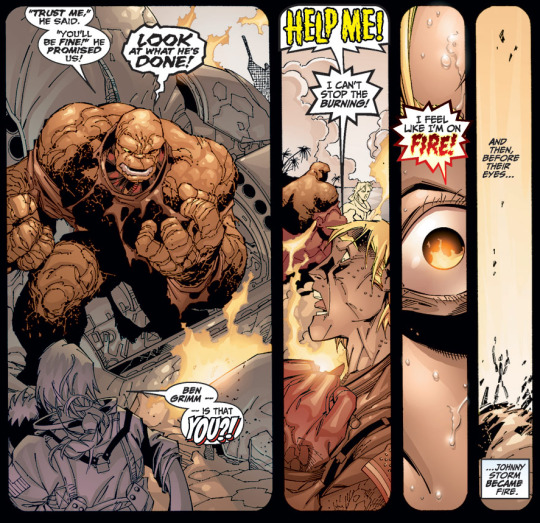
(Fantastic Four v3 #11) There’s also a lot of women in Claremont’s run! A valid criticism of Fantastic Four canon is that by its initial core team makeup it tends to be lacking in female characters compared to some other big Marvel staples, but Claremont brings in a ton, from Reed’s college friend and fellow genius Alyssa Moy (who has been done dirty by pretty much every other writer who’s ever touched her, including Waid and Hickman) to multiversal bounty hunter Bounty to the most platonic of Johnny’s gal pals Caledonia to Valeria Von Doom, a “time dancing” teenage incarnation of the baby Sue lost back in Byrne’s run, who sets up baby Val’s eventual return. Claremont is also king of Reed vs Doom setups -- if you haven’t read his Fantastic Four vs X-Men miniseries, I highly recommend it, and he brings a lot of the two sides of the same coin energy from that into his Fantastic Four run.
The downside of Claremont’s run is that the plot is always there and always running and I could not explain half of it if you paid me. Things certainly happen! Like all the time! For seemingly no apparent reason! Stuff gets set up and then it’s not resolved and now we are in Latveria! I don’t think this is necessarily all that detrimental -- the run is still massively fun and the characterization is always fresh and interesting. It’s just that sometimes you have no idea what’s going on and you have to roll with it. And then sometimes you do know what’s going on but in the way where you know Claremont was just writing it because it’s his kink. Which is like, whatever. As authorial ids go, you can pretty consistently do worse than Claremont’s, I’ll give him that. So I do recommend on it the whole, as long as you’re not going into expecting the kind of plots either Hickman or Waid brought the book. Claremont’s is kind of like “stuff happens and it’s either weird or fun so just don’t pay too much attention to it.”
Aside from Claremont, I feel like I generally like far more Fantastic Four runs than I dislike -- but also I don’t hate Millar’s run, which is honestly bad, so it’s possible I’m just very forgiving with the Fantastic Four. I really like Robinson’s run, which is the last run before the Great Fantastic Four Drought of 2015-2018. It’s short, self-contained, and devoted entirely to one story, so it’s pretty tightly written, with good characterization and some very shiny art by Leonard Kirk. Straczynski’s run is decent enough for the fact that it intersects with Civil War -- I think he does his best to get into the heads of the characters re: their actions in Civil War -- and it leads directly into Dwayne McDuffie’s run, another brief one where Black Panther and Storm take over for Reed and Sue. Very fun. Marvel Knights 4 is also a fairly recent run that’s got some strong moments in it, although I feel it’s a little inconsistent in its handling of the characters. It’s still fun, though. For an older, longer run, I like Simsonson’s -- the art is very dynamic, even if the storyline kind of gets too involved with itself.

(FF #337)
I recommend Byrne’s run with the caveat that there’s plenty to dislike about it and plenty of reasons to avoid it, not the least of it being Byrne himself as a creator and a person. It’s heavily sexist in how it deals with Sue, it retcons a huge age gap into Sue and Reed’s relationship, and Byrne’s early departure sets up my all time least favorite Fantastic Four story. (Though that one is Roger Stern and later Tom DeFalco’s fault.) It is historic as Fantastic Four runs go, though, and there’s a lot in later runs that’s built over it or references it or borrows from it. So it’s a rec with a lot of caveats and I also understand why people might give it a skip -- I think it’s more important for an understanding of the greater body of Fantastic Four canon and the impact it had than for the actual run itself. I do think Byrne has some very interesting subtext with Johnny, although it never come to fruition, and while his Sue falls victim to a lot of sexism, I really like what he does with the character of Frankie Raye, who like poor Alyssa Moy I don’t think has ever gotten really good treatment ever since.
I have mixed feelings on both Millar and Fraction’s runs, not in the least because I think they end very similarly -- and that Millar did it better, which doesn’t say great things. Millar’s run is kind of like a trashy popcorn flick version of Fantastic Four; it’s not actually good, but I can’t say I don’t like the terrible eldritch monster in Scotland Christmas arc (Fantastic Four #564-565) and I’m sort of into future Sue. Fraction, on the other hand, takes a space road trip and makes it boring, which is the greatest Fantastic Four sin of all. He’s one of the rare writers who I think actually writes a bad Ben Grimm -- not the least because his run goes out of its way to try and label it Ben’s own fault that he was transformed into a monster. I do really like his FF (just the initials) though.
The only Fantastic Four runs I can say I really truly dislike are Tom DeFalco’s and Dan Slott’s, which sort of unfortunate because DeFalco’s is both long influential (I have no idea why because it’s honestly terrible like in terms of storytelling) and because Slott’s is happening right now. DeFalco comes onto the book on Fantastic Four #356 and stays on until Fantastic Four #416, at which point Marvel hit a literal retcon button to get out of the mess he’d made. (This leads into Fantastic Four v2, which is largely skippable -- it’s basically a mid-90s retelling of a bunch of early Fantastic Four stories that leads back into the FF heading back to the main universe.) DeFalco’s responsible for the Skrull retcon in the JohnnyAlicia marriage and for dragging that out for over 50 issues, the entirety of which feel like he was writing without a plan or outline or literally anything, and I have never felt like a comic book was attempting to gaslight me through its own incompetence or refusal to commit to things it set up itself as badly as I do with DeFalco’s run. (I like other non-Fantastic Four Tom DeFalco runs. I just hate this one.) Dan Slott’s run is just 25 issues and counting of badly written emotionless unfunny pages blandly stapled together and I so badly want Marvel to kick him off the book for its own good.
38 notes
·
View notes
Text
Station to Station (funk to funky...)
So, spurred on both by one of my previous headcanon posts getting liked and reblogged by @mean-scarlet-deceiver (who is totally awesome - go check them out), and by The Unlucky Tug’s magnum opus of a video essay about his take on the Island of Sodor (check it out below, and then check him out - both are totally awesome), I decided it’d be a fun idea to share some of my own headcanons about Sodor. Most of these are things I remembered while watching the video, which you can see here...
youtube
...And I’ll be presenting them in the order I remembered them. The video isn’t strictly necessary to understand this post - I just wanted to share it. It’s also worth having a copy of the Sam Wilkinson map (mentioned in the video) to hand, as it’s what I used as the basis for my take on Sodor. Yes, I know it’s a bit of a clusterfuck, but so is my version of the timeline, so...
***
1) Knapford is Tidmouth, and Elsbridge is Knapford
What do I mean by this? Well, what the RWS calls Tidmouth, the TVS calls Knapford. And what the RWS calls Knapford, the TVS calls Elsbridge.
Confused? I certainly was the first time I tried typing that! I’ll just explain the headcanon:
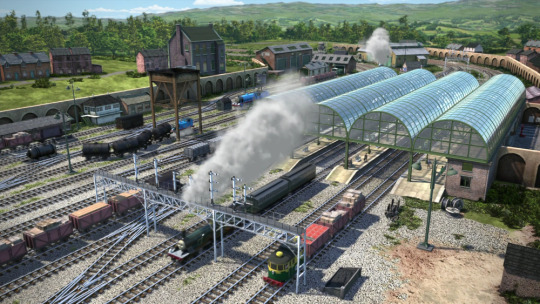
Basically, I go with what the RWS says. In other words, what the TVS calls Knapford, I call Tidmouth (incidentally, I prefer this version with the big yard alongside)...
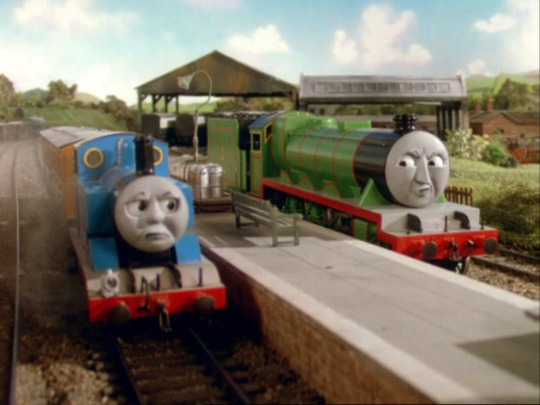
...And what the TVS calls Elsbridge, I call Knapford. I know this shot doesn’t really show the station, but I decided the yard in the background is part of Knapford as well.
2) Which harbour is which?
This is somewhat similar to HC1, in that I’m changing up some of the names of established locations. There are many docks and harbours on Sodor, but the show mainly focuses on Brendam (and either Knapford or Tidmouth in earlier seasons). Those locations change drastically from season to season, and I wanted to account for most of the various appearances. So in no particular order:
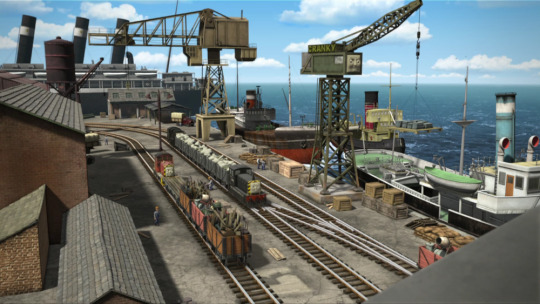
For Tidmouth Harbour, I use the current Brendam Docks (though my headcanon is something nearer to the real-life Southampton Docks).
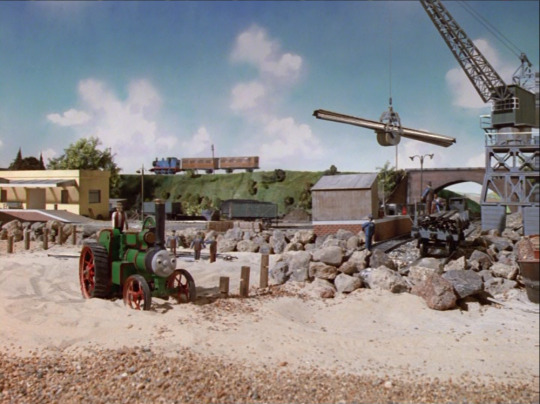

For Knapford Harbour, I use a mix of S2 Knapford Harbour and S3B Brendam Docks Just imagine that the former evolved into the latter over time.
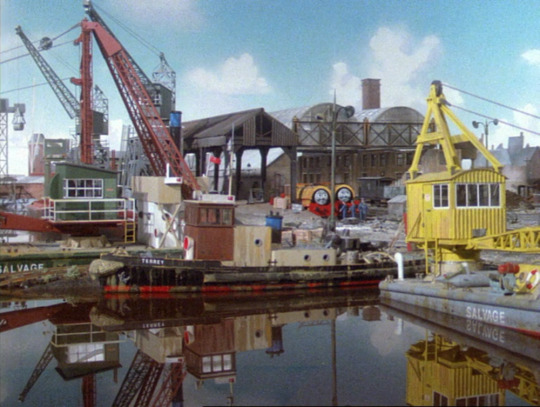
For Brendam Docks, I use the S2 Brendam Docks.
I’ve loosely based Arlesburgh and Kirk Ronan on the real-life Bristol and Weymouth harbours, respectively.
3) Two or three-track mind
Okay, this was something I only thought up after seeing Tug’s video. He points out that the number of tracks tends to vary between sets, and he decides on the following:
Three tracks means it’s somewhere on the main line.
Two tracks means it’s a branch line.
One track means it’s either the far end of a branch line, or a freight-only line.
However, he also makes the point that some parts of the main line are inexplicably double-tracked, such as Cronk Viaduct (which he moves to Wellsworth, but that’s neither here nor there):
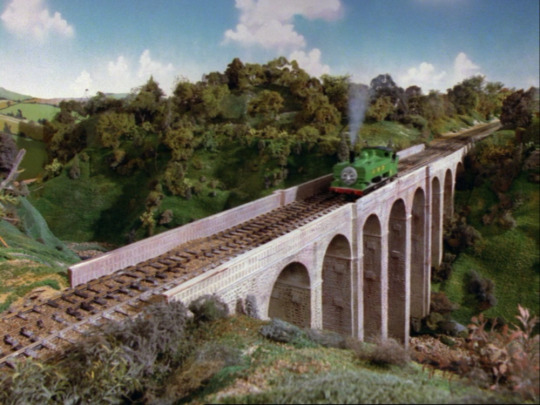
In cases like this, my headcanon is that the main line was originally completed as a double-tracked railway, with most of it being upgraded to triple-track later on. Obviously it may not have been possible or feasible to upgrade certain sections, hence them being left as double-track.
4) Lower Tidmouth
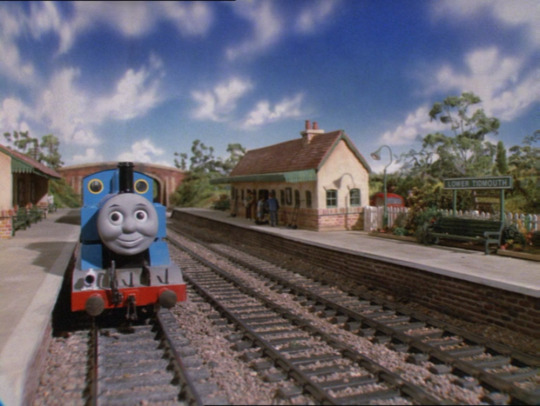
Now here’s one that I really like. This unnamed station from The Three Railway Engines was christened Lower Tidmouth by the TVS modelmakers. It’s located between Tidmouth and Knapford, and sits on the southern outskirts of the former town. Even though Tidmouth is a pretty large town - especially in my headcanon - its main station seems to cope well enough on its own, so why this extra station?
My headcanon is this: During the War, Tidmouth would most likely have been of great strategic importance, with its harbour and rail links - and therefore a prime target for air raids. Just in case the main station was bombed out of action, Lower Tidmouth was constructed just outside what was then the edge of the city, to serve as a temporary passenger terminus. After the War, the rudimentary station was given a major upgrade, after it was discovered that many people living to the south of Tidmouth found it more convenient than the main station.
5) Lower Tidmouth Tunnel
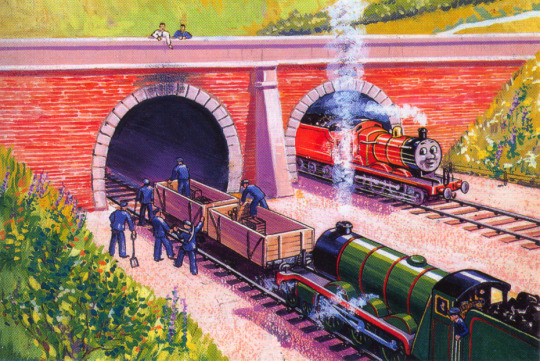
A much smaller idea now. This short tunnel is located between Tidmouth and Lower Tidmouth, and I just want to say I like to imagine that this looks the same as Henry’s Tunnel does in the TVS - two tracks in one bore, one track in the other. The only difference is that it’s built from red brick, as shown here.
6) Some ideas above Edward’s Station
This is a double-barrelled headcanon concerning Wellsworth. One concerns the station itself, and the other concerns its goods yard.
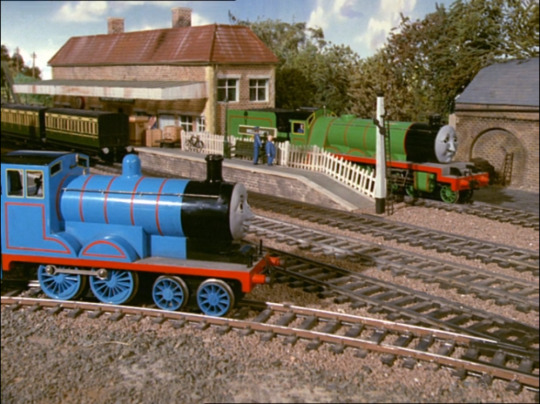
Firstly, the station itself. There’s been a lot of debate about which way round it should be. Should the footbridge be at the western or eastern end? Personally, I think it should be at the western end. My reasoning is that that would allow the bay platform siding (where Henry is in the above picture) to be at the eastern end, facing towards Gordon’s Hill. I assume that’s where Edward would normally be stabled when he’s waiting to bank trains up the hill. I just think it’s more convenient on that front.
As for the goods yard?
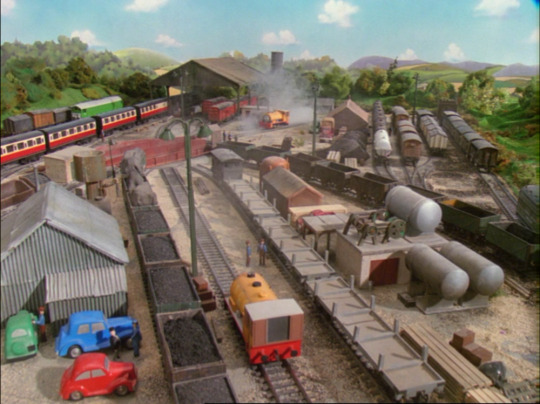
Well, I think this is Wellsworth Yard. That’s it. That’s the headcanon.
7) The Parkway Stations
This next headcanon concerns a rather obscure part of the Sodor railway geography - namely, these two tiny stations on the main line.
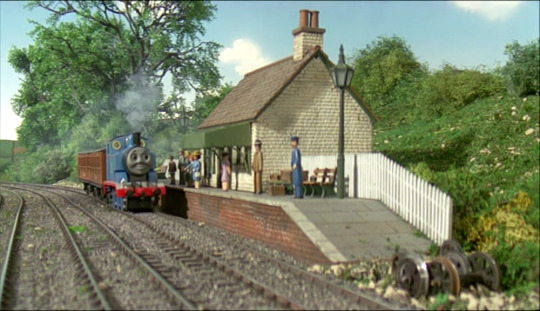
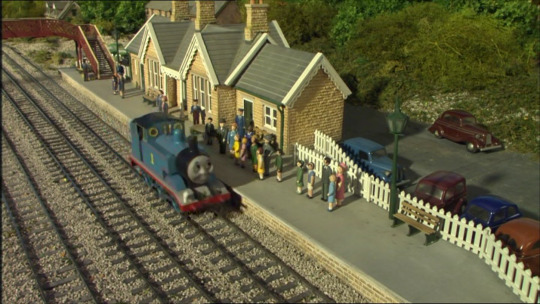
These stations serve the tiny villages of Balladrine and Kellaby respectively - though, in true railway fashion, they’re actually located some distance from the communities they serve. My original idea was to go down the usual route and just add the suffix Road to the station names, but then I was struck by a flash of real-life inspiration.
In the 1970s, British Rail opened a number of park-and-ride stations, which basically means you drive to the station, park your car and continue your journey by train. They usually have the suffix Parkway, as the first one was built close to the M32, which is also known as the Bristol Parkway.
Anyway, that’s the gist of this headcanon. The North Western jumped on this Parkway bandwagon around that same time, allowing people from the villages to either drive or catch a bus to the stations, and then catch a train to wherever.
8) The new Kellsthorpe Road

In my own personal timeline (which is a whole other headcanon in itself), Season 8 takes place in 1976, and it’s during this season that we see Kellsthorpe Road being built. Obviously the station had existed since the railway was built, so what’s with this new one?
Well, I like to think this was actually a relocation to somewhere more convenient for both the town and the junction with the Kirk Ronan branch.
9) Crovan’s Gate and other small works
I already touched upon this idea before in my Victor’s Haulage Truck headcanon, but if you haven’t read that, it goes like this:
I’m not a huge fan of the Steamworks and Dieselworks being separate facilities in separate locations. I just think the RWS version of Crovan’s Gate makes more sense, seeing as you would want all your major repair equipment and facilities to be concentrated in one location.
That being said, I wouldn’t say all this sort of work should be concentrated at Crovan’s Gate. It’s implied in the RWS that more minor repairs are carried out at smaller workshops across the rest of the system - I’d assume these are located at all the major engine sheds, and that there’s at least one on each branch line. These would also be useful for when there’s more work than Crovan’s Gate can take on at once.
10) The Sheds
Speaking of sheds, I have a handful spread across my version of Sodor. Basically, I have a couple at each end of the main line, and one on each of the branch lines. And since the highest operating district number in real life was 89 (for Oswestry), I’m gonna say all of the NWR’s engines are allocated to District 90, covering all sheds on the region:
Tidmouth (90A)
Knapford (90B)
Crovan’s Gate (90C)
Vicarstown (90D)
Barrow In Furness (90E)
Arlesburgh (90F)
Ffarquhar (90G)
Brendam (90H)
Peel Godred (90I)
Kirk Ronan (90J)
Great Waterton (90K)
Norramby (90L)
11) Dryaw Goods Station
Alright, this one is more about a specific episode than a location, but I thought it was worth throwing into the mix. This goods station only appeared in Thomas Gets Bumped, and nobody is quite sure where it’s meant to be. Some people say it’s Hackenbeck. Others say it’s Toryreck. Me? I’ve always thought of this as the original Dryaw Station, on what is now the Harbour line on the Ffarquhar branch.
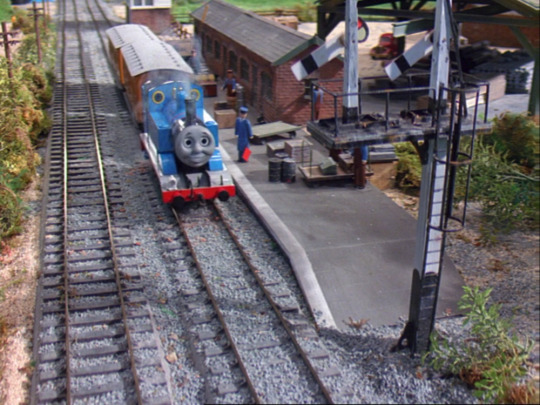
I say this because the surrounding scenery matches what’s shown on the map, and it makes sense for a freight-only station to be located on what is now a freight-only line. But if that’s the case, why does Thomas seemingly pass through daily with his passenger train?
I toyed with the idea of Thomas being there because he’s pulling a workers’ train, but then I came up with something better. In my personal timeline, this episode takes place during the initial construction of Knapford Harbour, and the new passenger line with it. More specifically, during a brief interim period between the closure of the original Dryaw to passengers, and the opening of the new passenger line.
12) The Sports Field Halt
At the end of the Sodor Explained video essay, Tug admits that he couldn’t think of anywhere to put this station from Three Cheers For Thomas.
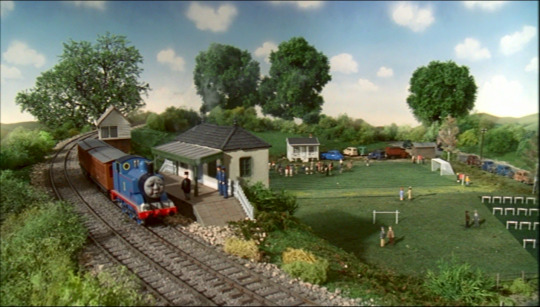
Sam Wilkinson’s map places this halt just south-west of Elsbridge, and that’s where I’ve decided to place it too. Not just because it’s semi-canon, but because do you know what other location is just south-west of Elsbridge?
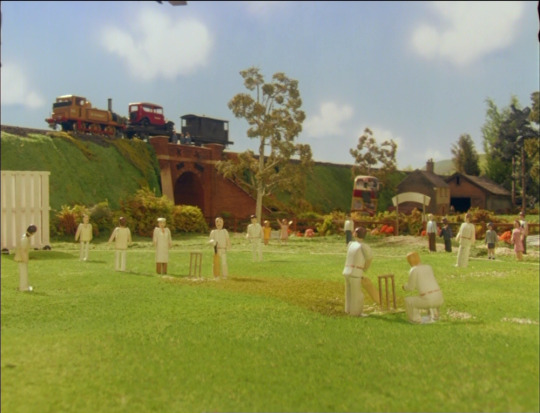
Yes, this cricket field. In my headcanon, I’ve merged these two locations together. Makes sense, right? They’re both sports related things, next to an embankment, and just south-west of Elsbridge. I don’t think it’s too much of a stretch, and you can always imagine the halt is a request stop serving the sports field.
***
Alright, I think that’s enough headcanons for one post. Firstly, because I underestimated just how much I had to talk about. And secondly, I’ve always said it’s not wise to put all your eggs in one basket. It’s much more sensible to just put out a short thing, let it simmer for a while, and then finish off the rest later.
I hope you guys have enjoyed this post. I certainly enjoyed finally getting all these thoughts out there. Stay cool, stay safe, and I’ll share the rest of my thoughts at some point in the future (even if they are as insane as the ones I’ve already shared so far!)...
#Thomas The Tank Engine#The Railway Series#ttte headcanon#sodor#island of sodor#North Western Railway
16 notes
·
View notes
Text
ST: The Next Generation S3 Watchthrough Episodes 22-25
The Most Toys: Dear TNG writers, I know that the show has been over for about 30 years now and this is therefore redundant to say, but… can you please quit doing bad things to Data?! He doesn’t deserve bad things! So Data gets kidnapped by a manchild/lunatic to add to his ‘collection’. Kinda reminds me of that two-parter in Superman: TAS that introduced Lobo… except Fajo somehow pisses me off even more than the bad guy there. Kinda makes me think of the bad guy from The Squire of Gothos in TOS except somehow more detestable. At least that guy was more or less a spoiled child, Fajo has no excuse. Anyways, Fajo’s obsession with Data comes of as… insanely creepy. It gives me very bad vibes and I was thoroughly uncomfortable. Though at least Data, in his Data way, wasn’t at all complacent and remained as inquisitive as ever, so at least he maintained some sense of agency unlike in say The Schizoid Man. That all said, the episode was good. The crew’s reactions to thinking that Data was dead all made sense and scenes like Geordi and Wesley going through his things and Picard giving an order to Data before remembering that he’s not there anymore… those were heavy. And again as painful as it was to watch, Data at least trying to retain any agency was appreciated especially at the end. I’m glad that he didn’t have to kill, but seeing him finally put Fajo in his place was especially after he killed Varria as callously as he did was extremely gratifying. Another solid episode overall… but again, please let Data have happier things up ahead. 3.5/5.
Sarek: You can only imagine how wide my eyes got when I was going down the episode list and saw this one. I know that Sarek has mixed reception due to the issues between him and Spock and IDK if Discovery is going to change my opinion or not, but I find him to be a very interesting character. Journey to Babel kind of had this sense that he’s a hardass not that different from his son tbh, and those similarities and being displeased with Spock’s life choices made things difficult. but Sarek did still care about him, IDT he’d have gone through the effort of going to Kirk in hopes of recovering Spock’s katra when he had no reason to believe that Spock did the transfer and even outright saying at the end that his logic is more or less impaired when Spock is concerned if he didn’t, and The Voyage Home had him outright finally tell him that he made the right choice and that he was wrong in the way only Vulcans can say things. There was just kind of this feeling that he realized that he had been wrong and regretted it and wanted to make amends… but didn’t know how and it took Spock dying to finally do so. He’s not necessarily a good parent, a lot of Spock’s issues are due to him not understanding his struggles, and yeah more or less disowning him for several years was shitty, but he’s not even close to the worst and he at least tried to make it right and I can respect that. If anything though, Sarek was at least shown to be a capable ambassador and genuinely loved and was good to Amanda. So seeing him in TNG and thankfully still played by Mark Lenard, I was interested to see what they’d do with him and how he’d interact with the new cast. The result?
Sarek, did hiding your heart condition in Journey to Babel teaches you nothing about revealing vital medical information?! Is this just a Vulcan thing?! Anyways, the revelations here were… sad. Sarek has essentially the Vulcan version of Alzheimer’s which is causing him to be unable to control his emotions. Which for a Vulcan… that has to be outright horrific. Not to mention it’s causing rising, unprovoked violent responses from the crew like Crusher outright slapping her own son. To no one’s surprise, Sarek’s the reason why, albeit he’s causing it unintentionally. While Mark Lenard has been excellent as Sarek alll across the board especially in the films, he gets to do a lot more here due to Sarek’s unstable emotional control and he is just fantastic. The whole confrontation with Picard was truly excellent acting from both him and Patrick Stewart. Sarek truly feels unhinged and it is both horrifying and just sad to watch especially to how dignified and composed he was in TOS. The mind-meld with Picard may help in the short-term, but... it’s likely inevitable that he won’t last much longer. My only real complaint is that Spock and Amanda are saved as a brief mention and technically not even by Sarek but by Picard enduring the aftereffects of the mind-meld, though it does reflect Sarek’s mindset/emotions. Seriously Picard-as-Sarek reflecting how much he loved them and regretting not being able to ever truly express it or outright say it… it’s just heart-breaking, thoug it does confirm everything I had already thought so that’s good~ Still, this was a great episode! I’m glad to finally have some Vulcans again, Sarek was very well done, and the entire episode is very well acted especially the previously mentioned confrontation and everything involving the mind-meld especially after when Picard loses it. I know that Spock will show up at some point in TNG so I hope that this episode comes back up because Dear Lord please allow Spock that closure before he has to be sent to AOS. Regardless this was excellent~! Thanks for reaching my expectaitons TNG~! 4.5/5.
Menage a Troi: Oh great, another Lwaxana episode… albeit she actually has my sympathy in this one cause a Ferengi is pursuing her. I might find the woman annoying, but considering what we know of how Ferengi treat women, no one deserves that. So… if anything I am fair or at least try to be, so I will say that Lwaxana is better in this episode. She’s still obnoxious, but with the aforementioned horrid way that Ferengi treats women (seriously the nudity part was an utterly unnecessary show), refusing to be treated as property, and her genuine love and concern for Deanna make her much more likable. She certainly didn’t deserve to be treated the way she did. Troi being sick of being talked down to as a child and her mother butting into her romantic life no matter how well-intentioned instead of just letting her take it at her own pace and when she’s content as she is now is very relatable as well. Look I’ve grown to like Riker/Troi and I’m all for them getting back together… but they should do so if and when they’re ready, not be pushed into that direction. Still overall, didn’t care for this one. It’s better than Lwaxana’s first two episodes, but still makes me uncomfortable in other ways that aren’t funny, and the fact that she’s still pursuing Picard and he gets forced to go along with it at the end (albeit Patrick Stewart getting to go full Shakespearian was the funniest part of the whole episode) still doesn’t sit right with me. The Wesley subplot was also utterly wasted, feeling like it was just shoved in there and he did nothing to deserve promotion to Ensign. Yes, he gave up his chance to go to the Academy when he has his aha moment, but he did barely anything all season or the last two seasons to have earned it, or at least shoving it into this episode made it feel undeserved. Wesley himself is fine as a character, he’s nowhere near as bad as some make him out to be, but the concept of his character is just… not suited for ST. But the was funnier than the past two and Lwaxana has her better traits higlighted such as her intelligence and acting skills. If anything she does genuienly love her daughter and is not a helpless victim. Majel Barrett also owns it, I can respect that. 2.5/5.
Transfiguration: Okay, so we have an injured alien known only as John Doe wo is both amnesic and has some impressive regenererative abilities. He also turns out to have mass power such as powerful healing abilities as his body is udnergoign some kind of rapid change,. Meanwhile, Geordi gets some kid of sudden confidence boost and is finally making progress with his love life. If I’m gonna be honest… I don’t have anything to really say on this one. It was fine, but I don’t really have any thoughts regarding it otherwise. There’s this sense of spirituality in there and the ending makes it feel like religious opression. The Zalkonians killing their own kind who undergo the transformation just to maintian their power… yeah that was… yeah. Anyway, it was fine. I felt bad for John Doe and Crusher was good. All I’ve really got to say for this one. 3/5.
Alright, one more to go! Next time I’ll only be covering two episodes, the S3 finale and the S4 premiere. But they’re the same story so…. I’ve heard good things about this one, so we’ll see if it delivers.
2 notes
·
View notes
Text
fixing The Menagerie
The circumstances behind The Menagerie pose an interesting writing problem: how do you take an already shot, totally completed episode for an earlier version of a TV show that differs considerably from the version that actually made it to air, and turn it into an episode that you can use now, as part of that later version, in a way that actually makes sense for your audience? That would be challenging enough without the additional problems that 1.) you can't reshoot any of the original episode because you no longer have access to the sets, costumes, most of the cast, etc., and 2.) the whole reason you're doing this in the first place is because you can't get a completely new episode out in time to meet your air date, so whatever your framing device is it has to be something that can be shot and finished very quickly--and cheaply, because at absolutely no point in the making of this show has there been spare money to throw around.
When I recapped The Menagerie (eons ago, it now seems) I said in the conclusion to the second part that I thought the framing device used wasn't as effective as it could have been. So, I figured I’d put my money where my mouth was and see if I could come up with another one. Before I start I want to put out the same disclaimer I used for the Return of the Archons post: I am not a professional TV writer (or a professional anything) and I intend this only as a fun exercise and not an angry and serious screed about the writing quality of TOS, which I do very much love for being what it is. I can only offer what, in my opinion, would make a more enjoyable episode, which may not necessarily be what you would find to be a more enjoyable episode. And if you already greatly enjoy The Menagerie as it is, you probably won’t want to read this.
For the purposes of this post, I’m going to take The Cage itself as written. It has its own problems, and that might be worth its own post at some point, but I’m not going to take it on here. We’ll assume The Cage exists exactly as it was produced, and the problem now is entirely focused on how to turn it into an episode—or two—of TOS.
(And, just to get it out of the way: I’m not going to talk about how either The Cage or The Menagerie play into Discovery, AOS, or the rest of Star Trek in general. It’s obviously a very important episode backstory-wise, but for this, right now, I’m just going talk about it purely as a TOS episode.)
So, with that out of the way, let’s talk about The Menagerie for a moment. What’s wrong with it?
Well, the framing device could certainly have been worse. It’s not terrible. Hell, Part I even won a Hugo, so, guess I’m up against the Hugo committee on this one. But, there are a number of things that I find awkward about it.
In a general sense, there’s the way that, once the flashbacks start, the story is attempting to maintain two separate threads of tension: the flashback story, with the tension being on what’s going to happen to Pike, and the present-day story, with the tension being on what Spock is doing, why he’s doing it, and whether he’s going to wind up getting the death penalty for it. This second thread starts out well—by this point in TOS, we’ve gotten to know Spock well enough to know how out of character all this is for him, which makes the mystery quite gripping. However, once the flashback starts, the story struggles to maintain the tension of this second thread. The attempt to keep the present-day story as tense as the past story only results in breaks away from the action for scenes in the courtroom where something or someone stops Spock from showing the footage, which never results in anything because by the next commercial break they’re back at it. Most of these interruptions are either arbitrary (the screen goes off for no reason and then comes on again for no reason; fake!Mendez randomly decides he’s had enough and tries to stop things) or just not that interesting (Pike fell asleep), and with each one it only becomes more obvious that the only real purpose they���re serving is to pad out the framing story.
The resolution of the present-day story is also rather unsatisfying for a lot of reasons. After so much tension built up about what’s going on and why Spock is acting this way and is his life on the line and is Kirk’s career on the line and how’s he going to get out of this...it turns out that Mendez has been fake this whole time, so nothing he said or did since Kirk left the Starbase matters at all; Starfleet casually waves the whole thing aside with no repercussions, making all the build-up about Spock risking the only death penalty remaining in the Federation mean nothing whatsoever in the end; and we never really get a satisfactory answer as to why Spock insisted on carrying out his court martial the way he did. Sure, eventually the Keeper says the whole court martial was basically staged to stall Kirk so he wouldn’t focus on getting control of his ship back, but not only does that raise further questions—if Mendez was only ever an illusion sent by the Talosians, why did he try to stop the court martial several times? Why did the Talosians turn off the footage at a crucial point, and why did it come on again?--there’s also no reason given why Spock couldn’t just recount what happened himself, which could have taken up enough time if he was careful enough about it, instead of needing the Talosians to broadcast a video version of the events.
There’s also the simple fact that Pike’s ending is itself rather dubious. I suppose this one comes down to a difference of opinion between me and Gene Roddenberry (one of many) since both The Cage and The Menagerie end with a character going to permanently stay with the Talosians, with no concern at all expressed about the fact that the Talosians are cruel, torture-happy, and frankly insufferable wannabe-slavemasters who see humans as nothing more than brute animals to be caged, bred and make to work. I said I wasn’t going to tackle The Cage here so I won’t go off about its ending, no matter how much it pisses me off. But The Menagerie is also at fault here, because it needlessly repeats the exact same problem (with a bit less sexism, but still). The ending of The Menagerie gives us no sign that the Talosians have reformed in any way, and no explanation as to why they suddenly care so much about Pike to go to all this trouble for him. We’re just expected to believe that Pike’s gonna go have a nice happy illusion-life with them even though the last time we saw them they were trying to breed a race of human slaves. Really, Gene? Really?
On that note, the treatment of disability in both The Cage and The Menagerie bothers me a great deal. The effect of Pike becoming disabled is to essentially strip him of all his autonomy. I mean no disrespect to Sean Kenney here, but if they’d replaced him with a mannequin it wouldn’t have made any difference at all to the episode, because in The Menagerie Pike is not a character, he’s a prop. We’re assured repeatedly that Pike thinks and feels as much as he ever did, but we have to be told that by other characters because the episode certainly never takes any opportunity to let us in on any of it. Here’s the sum total of what we know Pike thinks about the events of The Menagerie:
1. He doesn’t want to visit with Kirk and McCoy at the beginning of the episode but allows Spock to stay.
2. He tells Spock “no” when Spock tells him his plan.
3. He keeps repeating “no” the rest of that day, which everyone is confused by but no one makes any effort to understand.
4. He falls asleep at one point.
5. He votes for a guilty verdict for Spock during the court martial, when asked.
6. He says “yes” when asked if he wants to go live with the Talosians.
Pike is treated with sympathy and the respect due to his rank and history, but mostly he’s an object of pity. We’re told he can move his chair himself, but he appears to be confined to one small hospital room that’s not even set up for his needs, and he spends the entire episode being moved around by other people. Everyone talks about how bad his situation is, but only Spock attempts to do anything to improve it—and he does so knowing that Pike doesn’t want him to do it. When Pike tells him “No,” Spock doesn’t ask any questions, he doesn’t try to find out what part of this whole thing Pike is objecting to, he just overrides Pike’s objection on the assumption that Pike is only concerned about Spock doing something so very illegal, a concern he pretty much disregards. He turns out to be right—as far as we can tell—but for all the information Spock has at the time, Pike might have been saying, “No, I don’t want to live with the Talosians.”
It doesn’t need to be that way. Pike’s condition is certainly very severe, but as I mentioned in the recap, there are plenty of other things that could have been done for him, or at least attempted. And even if none of those were done, there are other ways that the episode could have developed his character, or at least treated him like a character. Spock’s discussion at the beginning of the episode could have been a mind meld that allowed us to hear Pike’s thoughts on the matter. Spock could have heard his objections and addressed them, and he and Pike could have come to come to an agreement and actually become co-conspirators instead of Pike spending the entire episode as a helpless hostage to Spock’s plan. We could have gotten a scene of Pike and McCoy interacting after Spock tells McCoy to look after Pike—McCoy’s not only highly suspicious at that point and unlikely to be greatly put off by Spock's order to not ask Pike any questions, he’s also the one who gives a whole speech about how cruel it is that Pike “can’t reach out, and no one can reach in”--so give us a scene where he does reach out! We could have had a scene of Kirk talking with Pike—he’s certainly got plenty to ask the man about, both in general and in regard to the current situation. All he has to do is put a little extra work into how to frame his questions. The Talosians could have delivered a message from Pike at the end, or one of them could have astral-projected in earlier to have a telepathic exchange with him. We could have seen Pike express himself by moving his chair, turning towards or away people when they talk to him, interjecting a “yes” or “no” into a conversation instead of only replying when asked something, or repeating a response incessantly to show that he’s emphatic about something. (Yeah, we kinda get the latter when he’s saying “no” over and over early in the episode, but that’s only treated as a “what could he possibly be trying to communicate??? oh, if only we knew!” moment.) There were so many ways Pike could have been treated as a character, as a person, instead of a plot element who exists to be pushed around in his chair and have speeches made about how tragic his situation is.
Both The Cage and The Menagerie end with a character who is disabled choosing to spend the rest of their lives isolated from the entire rest of humanity on a barren planet inhabited by jackass aliens because, as everyone around them nods and solemnly agrees, that’s a better fate for them than living among human society. To be clear, it’s not Pike and Vina seeking solutions to their problems that I object to. If Vina wants to be represented by what is essentially an avatar of her own choosing, or if Pike feels that an illusory world offers better quality of life for him, that’s entirely their right. But when life with the Talosians is set up as a situation so horrible that we see four characters literally willing to die rather than remain on Talos 4, and then have two disabled characters say “actually it’s better this way if I stay here,” you kind of wind up with a message that looks a lot like “being disabled is a fate worse than death.” I doubt that was intentional, at least not entirely, since we see other disabled characters in TOS who are treated considerably better—but there it is, all the same.
This is not to say that there’s nothing of value in The Menagerie’s framing story. The tension between Kirk wanting to trust his friend but being forced to act in authority over him because he’s undeniably done something very seriously against the rules, and he won’t tell Kirk why, is great while it lasts. Spock’s character is expanded considerably by showing us that there are some things he places above his honor and obligations as a Starfleet officer—and indeed above his own life. We see a bit of his history, a glimpse of a relationship with a former captain that he respects so much that Spock will put everything on the line to secure a better future for him; and we see how much he respects and values Kirk, that he foregoes the chance to explain himself—and thus gain an ally and aid in his cause—because to do so would put Kirk in danger as well. And we get that great little moment where Spock tells McCoy to call security on him and McCoy has absolutely no idea how to react. And we get backstory! And kind-of-continuity! Okay, it’s not much backstory, but by TOS standards it’s practically a goldmine.
I don’t want to throw all that away. But I think there must be some way to address the problems without totally losing the good parts.
It’s only fair, though, that any attempt to improve the episode should keep in mind the circumstances it was made under. I don’t know enough about budgeting and producing TV in the 1960s either generally in or in this specific case to know exactly what was available to them when it came to producing The Menagerie, so I’m just going to try to deduce roughly what we might have to work with based on what what was in the finished episodes:
Much of Part I and all of Part II take place in preexisting sets, either the Enterprise ones or the shuttlecraft interior set. The new sets include the Starbase 11 exterior—which is mostly a matte painting—Mendez’s office, Pike’s hospital room, and the Starbase computer room. The computer room is a redressed Engineering set; I suspect the hospital room is also a redressed existing set, but I don’t know for sure. It’s quite simple regardless, and is clearly mostly using existing pieces (the bed and the chair). Mendez’s office is likewise set up with pretty standard preexisting TOS set dressing pieces, with the exception of some cut-outs outside the window standing in for the Starbase exterior.
Discounting any background extras we have five new characters: Commodore Mendez, Piper, Chief Humbolt (the computer room guy), Lt. Hansen, and Pike himself. Of these, only Mendez and Pike have much significant screen time. So, we can assume that hiring an extensive guest cast is probably not on the table here.
Most of the original cast from The Cage are probably not available. Pike we know is definitely out—Jeffrey Hunter wasn’t willing to come back after The Cage failed, and probably would have been too expensive to hire for two episodes anyway. Leonard Nimoy and Majel Barrett were, obviously, still working on TOS, so presumably we could incorporate past-Spock and Number One if we really needed to. Since Malachi Throne was also on hand for The Menagerie, we could record new dialogue for the Keeper (as The Menagerie did indeed do), but presumably no new footage (Throne voiced the Keeper, but they and all the other Talosians were portrayed onscreen by female actors). I don’t know if any of the other original cast could have been gotten back, but since they weren’t, let’s assume we can’t use them.
Let’s also assume that all of the sets, costumes, makeup, etc., from The Cage are inaccessible. In reality I’m sure at least something was still kicking around in storage somewhere, or was reused for TOS, but there’s no point in trying to figure out exactly what, so for simplicity’s sake we’ll say anything we might want to use from The Cage has to be recreated from scratch, and if it can’t be then we can’t use it.
Because the entire reason this is going on in the first place is because the effects work was making TOS run behind schedule, we can’t have much in the way of effects for The Menagerie, especially post-production effects. There’s a shot of the planet Starbase 11 is on, a matte painting for the Starbase 11 exterior, a couple uses of the transporter, Pike’s chair and makeup, some shots of the Enterprise and the shuttle flying around in space, and some things being shown on screens—and I think that’s more or less about it.
So. If I was told that I had to take The Cage and wrap it up as a TOS episode with the above restrictions in mind, here’s some things I would keep in mind:
If we look at this from a starting-from-scratch perspective, it seems to me that if you have an episode that you need to incorporate into your main show that has an almost entirely different cast, and one of the characters from your original episode, who has never once been seen or even referenced in your main show, is played by an actor that you can’t get back, the simplest thing to do is to not show that character. We don’t actually need Pike himself to be onscreen for The Menagerie. That he would be at least mentioned in some capacity, sure, but we do in fact have the opportunity to avoid putting some poor dude through five hours of makeup by simply having Pike remain offscreen. We'll probably wind up putting someone else through five hours of makeup, but we'll get to that in a bit.
For me at least, if the Talosians are going to re-appear, they either need to still be villains in some sense or we need to know that they have begun to change their behavior in some way. To have them simply show up again and be treated as friendly after everything that happened in The Cage, with absolutely no acknowledgment of the fact that they did do everything they did in The Cage...it just doesn’t make sense, and it’s much too distracting for me to get past.
Although I’ve set the rule that I’m not going to change The Cage itself, The Menagerie being a sequel to those events opens up the opportunity to follow up on the ending of The Cage in a different direction. In other words, I’m going to rescue Vina, because her fate in The Cage really, really bothers me.
Insisting on the preexisting footage being literally shown as a video in-universe has always felt pointlessly awkward to me. It’s so weird that the characters have to stop and go, “Hang on, what? Where’d this come from? This can’t possibly be security footage. Why does it have different camera angles?” to forestall the exact same questions the audience were probably having at that point. And, as I said above, there’s really not a good explanation as to why the footage did have to be shown in that manner. It seems to me that it would be much simpler to have the flashback footage be just that: a flashback. A story which is being recounted, but not literally shown, in-universe. By doing so you avoid having to open up a bunch of dead-end plot threads about why the footage looks the way it does and is being shown the way it does. I think we can give the audience at least enough credit to assume they’ll understand that if a character starts recounting an event, and the scene cuts to footage of that event, that footage is a representation of what the character is saying, not literally something being shown in-universe.
I’m not going to bother with the whole “going to Talos 4 warrants the death penalty!!” thing. It doesn’t make a great deal of sense to begin with, and it never actually pays off in The Menagerie. We can manage a better source of tension than that, I think.
All of this would ultimately take my version of The Menagerie in a pretty different direction than the actual episode, I admit. It's a rather drastic change, but, if I was tasked with writing a framing story for using The Cage in TOS, here's how I'd do it:
The Enterprise is out tooling around doing their usual business when Uhura picks up a distress call from a ship stranded in space. It’s very faint, distant, and there’s something odd about it, but of course they’re gonna follow up on it because that’s how they roll. So they head off in the direction of the call, but the funny thing is that as they get closer, Uhura says that the source of the distress call appears to be moving around. They follow it, send some hails, and finally get back a scratchy, staticky response: it’s coming from a ship that’s been heavily damaged, and the crew is no longer able to steer it, so it’s drifting erratically through space. Kirk has Uhura send a hail: “We’ve received your signal. Keep broadcasting it and we’ll find you.”
They keep following the ship. It’s difficult—the call is weak, and the Enterprise has to go carefully or risk overshooting it. After they’ve been chasing it for a while, Spock points out that they should be wary of entering a nearby star system, because it contains a planet all Federation ships are warned to avoid. Kirk, of course, doesn’t want to give up on the damaged ship, but Spock steps over to his chair and quietly says, “Captain...I should warn you that it may be the lesser of two evils to abandon this ship, rather than risk going too close to Talos 4.”
Kirk, of course, is stunned to hear Spock say this, and asks what makes Talos 4 so dangerous. Spock says it would take rather a long time to explain. Kirk says that Spock almost sounds like he’s familiar with the place, and Spock replies, “More than familiar, captain. I’ve been there before.”
[dramatic sting, cut to commercial]
Since it looks like the damaged ship will take a while to track down, Kirk has McCoy, Scotty and Spock convene in a briefing room to hear Spock’s story. Spock gives a short introduction: “What I am about to tell you, gentlemen, occurred as I said thirteen years ago, when the Enterprise was under the command of Captain Christopher Pike. I’ve pulled up the log entries of Captain Pike pertaining to this time to provide his own perspective on the matter, as it was he that had the closest encounter with the Talosians. At the time, the Enterprise had only recently escaped a disastrous encounter on Rigel 7 which had resulted in the deaths of three crewmen and injuries to several more, including myself. Some of the injuries were beyond the capacity of the ship’s doctors to treat, so we were en route to the Vega colony for treatment when we began receiving a distress signal...”
Spock’s voice-over fades out over a transition to the Cage footage. We watch that--perhaps interspersed with the occasional bit of narration from Spock, or a question from Kirk or McCoy or Scotty--until about the point where the landing party encounters the fake survivors' camp and Pike is captured by the Talosians. Then Spock is suddenly interrupted by Sulu calling Kirk to the bridge. Everyone hurries up to the bridge, where Uhura reports that the distress call has suddenly disappeared. Sulu says it's not just that: somehow, he doesn't understand how or why, his sensors are suddenly showing that they're not on the same course or even in the same place that they were only moments ago. Somehow, they've wound up in the Talos star system--and they're heading directly for Talos 4.
"It is just as I feared," Spock says gravely. "This has all been a trap."
Kirk orders Sulu to change course, and he tries—but somehow the ship doesn’t divert even a little. It’s like the helm just isn’t responding. Kirk does all the usual things, telling Scotty to do something, etc, nothing’s working, and then Uhura reports that they’re receiving a hail. And it appears to be coming from Talos IV.
Naturally Kirk tells her to put it on. The voice on the other end is staticky and faint. "Greetings. Is this...the Enterprise?"
"This is the Enterprise. I'm Captain James Kirk."
Silence for a moment. Then the voice on the other end, obviously surprised, says, "Captain Kirk? Not Captain Pike?"
"Captain Pike no longer commands this vessel."
There's a long pause. "I see. We were...in error. We apologize for the deception, Captain Kirk. It was important that we bring Captain Pike to this planet, but we feared that his...past experiences here...would leave him unwilling to come close enough to hear our message.”
“That would be a most logical decision for Captain Pike, were he here,” Spock says coldly. “Considering the nature of those experiences.”
“You speak as though you are familiar with what transpired here before, then.”
“I am First Officer Spock. I was present aboard the Enterprise as Science Officer during the events thirteen years ago.”
There’s an even longer pause. When the voice returns, the signal is even more crackly than ever. “Our apologies, this communication is...difficult to maintain. We must wait to deliver the message in full until you are...closer to our planet. However...until then...you may be assured, Spock...that this time...” [pause for more crackling] “This time...the intent of the Talosians...is peaceful.”
The signal cuts out, and Uhura can’t get it back. The ship appears to still be locked on course for Talos 4. With seemingly nothing else to do for the moment but wait, everyone goes back to the briefing room, where Spock continues recounting Pike’s story.
At some point, Spock has to pause so everyone can go take a break, and everyone else files out of the room while he remains behind for a moment, staring at the computer contemplatively. Then suddenly, we hear a voice saying, “Spock--” and Spock turns around in surprise. We can’t see exactly what he’s looking at, only a soft glow at the edge of the camera, and then the scene cuts away.
Kirk’s grabbing a nap in his quarters when he’s woken by an urgent message: they’re still some way from Talos 4, but the ship appears to have stopped moving all on its own. He hurries up to the bridge, where Sulu tells him that it seems like they’re having some kind of computer error with the helm, but they can’t track it down yet. In the middle of all this, Uhura whirls around and exclaims, “Sir! Shuttle bay reports Mr. Spock has knocked out the tech on duty and is boarding one of the shuttles!” Kirk yells for security to get down there, but they are, of course, too late: Spock rigged the shuttle bay doors to open automatically and flies out before they can stop him.
Stunned and confused, Kirk orders Uhura to raise the shuttle, which she does.
“Spock, are you out of your mind?!”
“Negative, captain. My reasoning is quite sound, though I regret I cannot explain it to you just yet.”
Kirk yells for the tractor beam to grab the shuttle, but Sulu can’t get the tractor beam to respond either.
“You need not be concerned, captain. I believe it is well within Mr. Scott’s abilities to repair the computer in due time.”
“You did this to the computer?”
“It was necessary. You will find the transporter similarly incapacitated. I could not risk you coming after me, or stopping me. Not yet.”
“Spock—do you know what you’re risking by doing this? You were the one who warned me not to go near Talos 4!”
“Yes, captain. And it is because I know what the Talosians are capable of that I am doing this. Either they are telling the truth, in which case there is no danger...or they are not, in which case it is better that I alone risk doing this.” A pause. “Jim...wait 24 hours for me. If I do not contact you by then...you must leave in all haste.”
“I’m not leaving you behind!”
“You must. 24 hours.” And with that, Spock ends the call. As Uhura’s trying fruitlessly to reestablish contact with him, she suddenly looks up and says, “Captain...we’re receiving a message from...Fleet Captain Pike?”
“What?”
“Yes, sir.”
“Well...put him on.”
So Uhura puts Pike on speaker, and Kirk says, “We’re, er, in the middle of a bit of a situation, sir...what can I do for you?”
“I might ask what I can do for you, captain. Mr. Spock left a message requesting that I contact you.”
Stunned pause for a moment. “He did what?” Kirk finally says.
“About an hour ago. I regret I wasn’t able to return his call earlier, but it’s the middle of the night here...Kirk, what’s this all about?”
Kirk sighs. “It’s a long story, captain, and I don’t entirely understand it myself. Uhura, patch this into the briefing room...it’ll take a while to tell.”
A little later, we see Kirk and McCoy sitting in the briefing room as Kirk finishes up explaining everything to Pike. “What do you make of that, captain?”
“I’m not sure what to make of it, Kirk. I can’t imagine why Spock would want to go to Talos 4. All Federation starships have been warned away from there ever since our encounter with them, and Spock’s well aware of that.”
“Yes...Captain, I confess I’m not familiar with the entire story of that encounter myself...Spock was telling us about it before he, er, left, but he hadn’t finished. Could you enlighten us about the rest of it? We do have your logs, of course, but you might have more information--”
“Yes, I see what you mean. I’m not sure I’ll be able to help, but I can at least tell you what I know...”
Pike continues telling the story where Spock left off. Around about the point where Pike and the others escape from the cell, there’s a call from the bridge reporting that their sensors show that the shuttle has landed on Talos 4. Frustrated, Kirk wonders once again just what Spock thinks he’s doing down there.
We then cut to a shot of what looks kind of like the barren landscape of Talos 4, only this time there seems to be a small surface settlement among the cliffs. Then we see Spock entering a small, plainly decorated room with windows looking out to the rest of the settlement. “I am here, as agreed,” he says, and then the camera turns to show us a figure wearing a robe and a hood sitting at a table in the middle of the room.
“Welcome, Mr. Spock," the figure says. "Won’t you sit down?”
Back aboard the ship, Pike finishes telling Kirk and McCoy the story.
“So...that’s all of it?” Kirk says.
“Yes. We left Talos 4 and never looked back. Never heard anything from the Talosians, either, but Starfleet marked the place as too dangerous to visit just in case.”
“Poor Vina,” McCoy murmurs.
Pike sighs. “Leaving her there is one my greatest regrets. She seemed determined to stay, but...Even put in a request to go back, once, but Starfleet wouldn’t allow it. Too risky. I often wonder what happened to her. If she was really happy with them after all. But, as you may have gathered, Kirk, none of this explains just what the devil Spock thinks he’s doing--”
He’s interrupted by a call from Uhura: “Captain—message coming from Mr. Spock!”
“Put him on! Spock, what’s going on? Are you alright?”
“Quite well, captain. Has Captain Pike contacted the ship yet?”
“I’m on the line right now,” Pike says. “Spock, what do you think you’re playing at?”
“Ah, captain. I have someone here who wishes to speak to you.”
We then cut back to Spock sitting at the table with the figure, who takes his communicator and says, “Hello...captain.”
Pike is too stunned to speak for a moment. “Vina...? Is that you?”
“The very same. I’ve missed you.”
“I don’t understand. What’s going on?”
Between them, Spock and Vina explain just what is going on. There's been a change in Talosian society since the Enterprise left. Not all of the Talosians agreed with the plan to breed a slave race to begin with—others felt that they could, and should, attempt to reclaim the surface themselves. The incident with Captain Pike brought matters to a head, and a rebellion erupted shortly afterward. Once in power, the new leaders dedicated their efforts to repairing their ancestors’ machines and establishing a colony on the surface.
The reason the Enterprise was lured back to Talos 4 was Vina: she's had medical problems as a result of the crash and the botched surgery, and it's been getting worse for years, to the point that she likely won't live much longer if she doesn't get proper treatment. The new Talosian leaders wanted to make up for what their predecessors had done and gave her the best care they could, but simply didn't have the human medical knowledge to fix the problem. So Vina asked if they could help her get home, instead. The Talosians were concerned, however, that the Federation wouldn't believe a genuine call for help, given their history, so they hatched the plan to lure the Enterprise, and Pike with it, back to Talos 4. They've been waiting for quite a while, listening to subspace chatter, hoping the Enterprise would come near. Once it did, they put out the illusion of the damaged ship to bring the Enterprise close enough that they could maintain an illusion over the helm controls, making sure the helmsmen were not altering their course as they thought they were.
When they discovered that Pike was no longer aboard the Enterprise, they instead sent a telepathic message to Spock, hoping that his own experience with the Talosians would make him see the difference between their current society and the old one, and thus be more likely to believe them. They had to wait until the ship got close to Talos 4, because the new society of Talosians have been deliberately letting their psychic powers weaken, attempting to break the addiction to illusion that was holding them back from reclaiming the surface. They were able to keep up the illusion of the damaged ship for a while, but couldn't manage that and the illusion on the helm and extended contact with the Enterprise at the same time, making the whole thing very nearly fall apart at one point.
Kirk demands to know why Spock ran off on his own, and Spock explains that while he found the Talosians' message plausible, a risk remained that this was all an elaborate set-up. They might have been attempting another pass at the plan that failed thirteen years ago. If that was the case, Spock would be the least risky member of the crew to make contact with them, since as a non-human he wouldn't be suitable for their plans. Since he knew Kirk would never agree to that, he took the shuttle and hacked the ship's computers to ensure that they wouldn't be able to follow him, at least for a while. He now feels confident that this is not a trap, though, as the Talosians' powers have weakened enough that his own mental defenses are strong enough to mostly see through them.
So Vina accompanies Spock back to the shuttlecraft, and they fly back to the ship. Vina's taken to Sickbay while Kirk confronts Spock about stealing the shuttlecraft. Spock says he'll accept all punishment, but felt he had to do it--he saw what almost happened to Pike on Talos 4, and couldn't risk the same fate happening to Kirk. But he also felt he owed it to Pike to investigate Vina's story, and help her return if that was truly what she wanted. Kirk lets the whole matter go, because of course he does, telling Spock not to try that shit again because he can't lose his best officer and all that.
Kirk and Spock go to visit Sickbay, where McCoy reports that with proper Federation medical care Vina's prognosis is good. Kirk wants to talk to her, but McCoy tells him to wait because she's got another visitor. Kirk glances around the doorway and sees Vina sitting up in bed looking at a video monitor, from which Pike's voice is coming. Kirk smiles and says he'll come back later.
Everyone goes back to the bridge, and with the computer damage now fixed, they're preparing to leave, when Uhura reports that there's a call coming from Talos 4. Kirk has a short conversation with the Talosian on the other end, who is glad to hear that Vina will be alright. They also ask that Kirk relay a message to Pike, extending their apologies for what he went through, which Kirk assures them he will. He then adds that the Federation would likely be willing to open trade negotiations with the new Talosian government, and the Talosian says they may take them up on that. And with that, the ship flies off.
Most of this story would only require the existing Enterprise sets, and potentially some brief shots of the shuttle interior. The only new locations needed would be the Talosian settlement exterior, which could be a matte painting, and the inside of the building where Spock meets Vina, which wouldn't require much dressing. The only non-main-cast characters would be Pike, Vina, and the Talosian that contacts the Enterprise. The Talosian is a voice-only role. Pike is also a voice-only role, and would require someone who can approximate Jeffrey Hunter's voice, but it's a lot easier to find a sound-alike than someone who's a sound-alike and a look-alike--plus Pike would be thirteen years older than in The Cage, which allows some leeway. I don't know if Susan Oliver would have been willing/able to come back to play Vina, but if she wasn't, a hood, wig, careful camera shots and some old-age makeup would probably serve well enough to disguise another actress. The only special effect needed is a bit of glowiness for the Talosian that appears to Spock just out of frame.
As for the fate of Pike himself, I don't want to erase a disabled character, but I also don't really feel that Pike's appearance in The Menagerie does any justice to him as a disabled character. Did Gene always envision that kind of fate for him or did he simply seize upon it as a plot device in a desperate moment? I don't know, so in the end I decided to leave it more or less open. There would be considerable leeway for multiple options that would still allow him to serve the same role in this episode: he could be commanding another ship, he could retired and settled down somewhere, he could have suffered an accident as he did in canon and spend this entire episode talking through a voice synthesizer. Imagine whatever one feels most suitable to you.
This is only my own take on the story. I know it would have considerable repercussions to later Star Trek canon and I'm not going to make the claim that those repercussions themselves would be better than what actually happened. It's certainly a more hopeful ending than The Menagerie, on the whole, which may not be everyone's cup of tea. But it was an interesting exercise.
71 notes
·
View notes
Text
A Little Response to Rhavewellyarnbag's latest Review of The Terror's "Horrible from Supper" (the italics are me)
Being another look at The Terror, episode 01x07, “Horrible From Supper”. But first, the characters in The Terror to whom I own an apology for the things I said last night when I was drunk, in ascending order of how vile it was: Francis. Yes, what I said was true, but I should not have said it. Goodsir, on general principle, because he is a nice man, and doesn’t deserve to have the likes of me talking about him that way. Author’s note: Only daily do I apologize to Harry Goodsir (fictional) for the things I say about him, and to Harry Goodsir (nonfictional) for the things I say about a fictionalized version of him. I like to think that the former would forgive me, but I think that the latter might not. I painted him from the few photos made of him; he has a delightfully reproachful look. Resting bitch face, even.
In the 1845 photos, his eyebrows come together in a way which could be interpreted as judgmental. But, when we think of the trials of sitting for a daguerreotype at that time (not nearly as jolly and pain-free as depicted in “The Ladder” –forgetting about the subsequent Tuunbaq attack) Goodsir’s reproachful look might merely result from the tedium of having his picture taken (or that fatal tooth was beginning to hurt). Tozer. Though, again, I meant it, and, like, look, I defy you tell me that he doesn’t look absolutely stunning when he’s afraid for his life in “Terror Camp Clear”.
“The Terror” certainly broadens the parameters of handsome-ness. Tozer, while listening to Morfin singing “The Silver Swan”, is more attractive than, than, than the Moon! Or the Pyramids! He’s supernatural.
The ship before it weighs anchor, before it, in some fundamental way, becomes a ship. Not yet having fulfilled its function, it is more like a theatrical set. The notion of limbo is a fitting one: the men descending the ladder, coming from the bright, noisy world above, could be entering the afterlife.
Who’s the cat who does the words about utter existentialism? Rod Serling, was that his name? Did everyone see his episode of “The Twilight Zone” about the toys in the Salvation Army barrel? Yikes.
Nothing is working as it should, logic is suspended, and the topsy-turvy world of the carnival will become real.
The movie “Topsy-Turvy” is a great favorite of la famille Sunbeam. Even so, there are useful parallels between that film and “The Terror”: class clashes, pretense and pageantry, and mainly ripping away the fine lace mask of the Victorian era. The attitude of the servants in both shows is strikingly craven.
“Any tips, sir, for a first-timer?”
In the super-heated world of fandom, “any tips for a first-timer” sounds like the sort of pick-up line EC would use on the true Cornelius.
Poor Morfin.
Morfin is “The Terror’s” equivalent of the Victorian Little Nell. Headaches, bad teeth, song-forgetter, probably a once-in-a-lifetime sodomite but nevertheless flogged for it. When he and Tozer go out on that exploratory mission, he falls flat down and Tozer says something like “Don’t volunteer if you don’t have the bottom for it.” (More heat for the fandom). And he gets to be the first to see the severed heads. (Who thought Tozer and Morfin would make a good team for this task? Did they draw names?) “Gently with that one, please.” It’s a little bit insensitive of Goodsir to express concern for his luggage before he does, Morfin, after Morfin’s just collapsed from pain, only looking like the living dead. That trunk, though, is Jacko’s tomb.
Harvey, your theory about Goodsir’s, ah, class-related selfishness is confirmed here.
“Are these our choices, Cornelius, or are they being made for us?” Gibson seems to falter, which is interesting. His idea to separate from the larger group doesn’t seem to be his own, which suggests that Hickey understood that it couldn’t be seen to have come from him. Gibson looks like death warmed over, but Hickey is just as perky as ever.
Gibson seems to get on-and-off injections of great intelligence, but his death-warmed-over look is consistent through the series.
Hickey is also under-dressed, not even wearing a hat.
This is perhaps a very English-major thing to say, but there is a suggestion of a climate change (or a massive change in consciousness) occurring after Carnivale, as if the trauma of the fire left living dead who can no longer feel the cold, or, having felt so much fire, the survivors have had the idea of cold burnt out of them.
He does sometimes dress more appropriately, as in “A Mercy” when he was helping Hartnell transport supplies for the carnival. Suggesting that, in this scene, Hickey means to maximize his attractions. The obvious beneficiary is Gibson, but I think Hickey sees some value in displaying himself for Tozer, the one Hickey is really after, and has been since at least “Punished As A Boy”.
A sexy thought; how much nudity the men would crave. When Hickey is flogged, he is completely exposed to the men present, and I think the sexuality of his having his pants pulled down really hits the sailors hard. Francis alone looks like he’s going to climb out of his skin with the ferocity of his feelings (I won’t say desire, but that’s what I mean). Was it you, Harvey, or someone else who discussed how strong the thirst for touch must be among the Franklin Expedition? I imagine the thirst to see bodies is just as powerful.
Then, I was immediately resurrected by the peek at Collins’ suspenders. He is... built like a cement outdoor commode. There is a lot of Collins to love.
The suspenders become iconic. Collins is one very alluring sailor, even in his bulky sea-diving outfit with that great furry head sticking out. Yet his sexuality seems neutered, compared to the other significant sailors (Still, if Hollywood decided to make a chubby “Wuthering Heights”, Collins would make the perfect pudgy Heathcliff.) Author’s note: I don’t think Francis thinks very much of Goodsir, and the feeling is mutual. Goodsir has to obey Francis, but it’s duty without devotion, without deference, Goodsir having seen very little that would indicate to him that Francis has reformed himself. Francis may have stopped drinking, but he’s up to his old tricks, dismissive unless he wants something, ingratiating when he does. This is the way that Francis behaved toward Hickey, which gives an interesting contrast between Goodsir and Hickey: once Goodsir understands Francis’ motives, he’s no longer taken in; Hickey must understand that Francis was only drunk and trying to get into Hickey’s pants, but Hickey continues to try to make Francis like him.
Francis might resent Goodsir’s place in society, so settled and unique, while Francis himself has to maneuver around Sir John and James and all the rest. But Hickey he can control. (In a way, it’s a shame that Irving, the stupid old king of coitus interruptus, has to bust in again. It would be in vain, and yet interesting, to consider what might have happened if that seduction had been consummated. Think of the bickering harem Crozier could assemble: Hickey and Jopson and Gibson and then Irving, etc etc. (But this speculation, that a captain would handpick a seraglio of sailors, is ruined by the knowledge that, despite all the porn stories and movies, there is no one a teacher would want less to seduce than her students.)
James has to move his little pick ax from one hand to the other to reach out to Francis, suggesting that, emotion aside, he made a conscious decision (his bones not yet reduced to broken glass) to grab Francis’ jacket, right over his heart, no less, and jostle Francis in a friendly manner.
This moment is comparable, to those who might be interested, to Star Trek: The Original Series’s “Amok Time” when Spock grabs Kirk by the arms. Quite the pensee could be written comparing Kirk-Crozier (the fair-haired captains) and Spock-Fitzjames, the haughty eyebrow-waggling second. The latter’s reserve is melted, melted utterly by his realization of how much he loves his Captain.
Author’s note: I am into Edward, but conditionally: I like him in that coat that makes him look substantial. Matthew McNulty is lovely, but he’s far thinner than I thought he was, which came as a bit of a shock.
His shortness is also quite astonishing. I can’t imagine Levesconte being involved.
Levesconte is too busy lying on his little officer’s cot, reminiscing about the time he said “benjo” and everybody cheered.
“There was a fourth man.”
I know you are referring to the raid on Silna in “Punished as a Boy”, but these words put one in mind of T.S. Eliot’s notes to the “Fire Sermon” in his “Wasteland”: “it was related that the party of [Anarctic] explorers, at the extremity of their strength, had the constant delusion that there was one more member than could actually be counted”. Ah, the hypnotic potency of the top of the world.
Did Edward just grab Irving’s knee? Judging by Irving’s expression, yes, I think he did. I think he leaves his hand there for the rest of the meeting. Actually, no, he does not, but he appears to again bring it down to the general vicinity of Irving’s lower body.
I have run this scene over again and again and again (like the Zapruder film), and I think Edward does make an aggressively intimate gesture: “left and to the back, left and to the back.” Irving does not seem displeased.
Hickey begins to assume what he imagines as Tuunbaq’s character. Having already, it’s implied, eaten part of Heather’s brain . . .
It is more probable that Hickey was just tapping at Heather’s brain, mainly because a brain IS not like a pudding; a pudding can be nibbled on without anyone noticing. But if someone nicks a part of a cathedral, which is a self-contained entity, it would be noticed by, at least, Nurse Tozer. Still Hickey might have tasted the cerebrospinal fluid, just for the Hickey of it.
When first aboard Terror, Hickey appears to be sizing up his new environment, but he also looks relieved, hopeful. It’s implied that he had a lucky escape from England, which had gotten too hot for him, but I think that he really believed that he was making a fresh start. Taking another man’s name was practical, perhaps a necessary evil, but I think that E.C. just didn’t want to be E.C. anymore.
I admire the symmetry of Hickey throwing a Neptune-sized bag down by Hodgson, thus startling him far more than one think a tough lieutenant would be startled.
Author’s note: . . Silna doesn’t fall into Goodsir’s arms, because there’s no reason why she would; she might like him, but he’s merely the least untrustworthy of a group of untrustworthy men who, by the end of the series, have not just made her home almost uninhabitable, but killed her father and her friends. Her discovery of Goodsir's body, the state it’s left in, confirms it: if this is what the British do to each other, she was lucky to get away when she did.
Hear hear!
By the way, if one is in the mood, another pensee could also be written about the real daguerreotypes of the Franklin expedition. I am particularly amused by Gore and Fairholme. Gore hates Lady Jane and this stupid thing she’s making him do. just so Sir John can be further exalted. Fairholme picks up the vibe and poses just like Gore, only he has to borrow the affable Fitzjames’ jacket.
I think we’ve all been there.
17 notes
·
View notes
Text
March 6: 2x09 Metamorphosis
Okay going to try this again!! Thoughts on Metamorphosis, which I watched last night. I love this episode so much and it definitely has a lot going on in it.
Kirk was definitely zoning out there right before Spock started talking.
Hedford wasn’t vaccinated! A nightmare scenario lol.
· I really wish they’d stop saying “the Starfleet.” Like… I guess it makes sense, “the Navy,” “the Coast Guard…” but it still sounds wrong.
I have such Mixed Feelings about Hedford because I appreciate that she’s such an important person in the Federation and I even get why she’s so easily annoyed in this episode, because she really did get the short end, she really is being kept from her important work, and she really is scared! And I totally get in theory why a person with her background and in her position would act the way she does. But she’s still annoying. And then I wonder, am I sexist for finding this woman annoying? I think I’d find the character annoying if he was a man, too… but would a male Hedford be written this way? That’s a real question. I don’t know. I can’t tell if she’s well written or just a stereotype or if my reaction is warranted or not. (Part of it is that I always get defensive of Starfleet lol.)
The design of the shuttlecraft is awesome. I love the cute, round little scanner!
Oh no, something is going wrong with the shuttle! Good thing we don’t have 3 of our most important officers alone on it and separated from the ship… oh wait.
Like look, Hedford IS annoying. “Just fix it! Yar!” But like I hate that I think that.
Cool planet. I like the purple rocks.
Kirk and Spock are acting in sync again.
Why are they here? Because the Companion was bringing her boyfriend new friends.
“We’re real enough.” Lol what does that mean?
Zefram doesn’t know what the Federation is. See Beyond this is how you write pre-Federation characters.
“Are you Earth people?” Does Spock LOOK like an Earth person?
AOS AU where Zefram says he was marooned and Kirk is like “Marooned you say? I don’t know what that’s like!”
“He talks a lot but he doesn’t say much.” What a burn.
I like Zefram’s house and his little palm tree.
I don’t think it’s weird that Hedford is hot if the house is kept a constant 72 degrees. Too warm!!
Kirk recognizes and likes the “antiques.”
The drama of the reveal of the Companion lol. The music! Their faces!
Spock’s like “Don’t gaslight me, I know an entity when I see one.”
My mom thinks Hedford is interested in Cochrane. Maybe… They don’t get to be around each other very long. And if so, she’s certainly not thirsting as hard as he is.
I’m sure that this isn’t what I’m supposed to get from the Companion de-aging Cochrane but my first thought was “oh she wanted a younger boyfriend.”
Why does Bones think this whole back story is far out? It’s just a story about an alien with alien powers? He’s currently standing right next to an alien with alien powers?
He died 150 years ago! Dun dun dun.
Kirk is confused as to what Zefram was doing in space at 87 as if he too wouldn’t choose to be in space at 87 if possible.
Not telling Hedford her own prognosis is very 1968 :/
I was just starting to warm to her and then she just freaks out! I mean I guess… it makes sense… she’s not as used to freaky aliens as the crew and the audience is and it is a pretty horrific thing to be just hours away from some kinda cure for your fatal illness and then an alien comes and takes you as a pet but…. I’m still annoyed because I’m a bad person.
Very awkward to give Spock orders to find a weapon. First because he’s a pacifist and second because he is obviously going to want to Study the Alien, not kill it. Like Kirk’s being practical as always and Spock’s still assessing the situation for scientific interest.
“Everything’s alive… Life everywhere…” This almost makes me cry. Yes! Space! Show me the aliens!!
I feel like this is just a version of Kirk the honey pot. Like he’s just manipulating his target again. You like what I’m saying? You like the idea of space adventures? Come with me… help us break free of the Companion…
Lol at Spock trying to meld with the Companion.
“A sort of joining….” Hmmm. What COULD that mean? The super romantic music. “More like… love.”
This is such a classic Spock and Bones scene. Spock doesn’t get up from his dramatic lying down until Bones shows up. Then he just spews all of his fascinating new information at him.
VERY CLOSE IN A WAY THAT’S HARD TO EXPLAIN. Umm, dude, they know. They saw. You’re fucking the alien.
Kirk WILL kill your alien girlfriend.
The Companion is angry now.
“I’m in command, Bones, it makes it my fault.” I will never get tired of pretty much this exact Bones and Kirk exchange.
“Maybe you’re a soldier so often that you forget you were also trained to be a diplomat.” !!!!
In other words, put your romantic cap on, Kirk.
It’s the Enterprise!! I thought I’d never see her again.
Little Scotty/Uhura moment there. (Aka… Scotty and Uhura interacting.)
The universal translator is the least likely Star Trek invention.
“The matter of gender could change the situation.” I mean, could it though? We’ve already established that they’re, uh, joining. Does it matter if he’s joining with a boy alien or a girl alien?
A LOVER. The Companion is closer to a lover than a zookeeper.
“He felt it to me.” Um, cute?
Spock wants to study it and Kirk is like “We’re talking about LOVE here, okay?”
Kirk is very frustrated by this being. Could it be she’s…too logical?
Red alert red alert the Companion is a girl.
“I don’t understand the emotion, but it obviously exists. The Companion loves you.” Oh, he’ll get it.
There’s a lot of weird gender stuff in this episode but the underlying concept is too good. And it’s also, like, impossible to completely force it, and its themes or lesson, into a completely traditional, heteronormative framework. Zefram is personifying that point of view now: the old school, uncomfortable with a new concept of love, and the narrative is not on his side. And neither are the three main characters.
Zefram is going on about how gross it is to love an alien and Kirk isn’t even look up…
This is very God made Adam and Eve not Adam and Snorlax.
“Fascinating. He’s so not with the times.”
This scene with Hedford. On the one hand, it makes me so uncomfortable. “If only I were loved, I wouldn’t be a stereotypical shrew.” Plus how it’s obviously setting her up to be fridged for the alien’s benefit. But that said… I do think love is more important than work lol. Like, the general concept that someone could feel unfulfilled because they’ve devoted themselves entirely to a task, to their career, to “getting ahead” at the expense of personal relationships, is certainly resonant with me. But because she’s a woman and because it’s the 60s, I fear the actual point is “career women are bad” and I get proactively defensive.
Hmm interesting that male and female are universal concepts but the Companion has a hard time with “love.” (I guess universal doesn’t mean easily described or translatable though.)
THIS SPEECH. KIRK ON LOVE. “Is he important to you? More important than anything? Is he as if he were a part of you?”
“Our species can only continue if we have obstacles to overcome.” Hmmm, this sounds awfully familiar. A classic Star Trek theme about the need to strive and innovate and grow. I think This Side of Paradise said the same thing in so many words.
They can’t have a union—um, they looked they were involved in a pretty complete union earlier, Kirk. I mean she literally surrounds him in his entirety, how much more united can you get?
“You are the Companion. He is the man. You are two different things.”
“But you will always be separate, apart from him.”
Kirk is so sad.
Like quite honestly that WHOLE speech was about Spock.
“Love sometimes expresses itself in sacrifice.” Ummmmm.
And then Spock’s there to remind him “You can’t expect aliens to be humans, Jim.”
Now the Companion taking all the wrong lessons from that speech. “He needs a human woman friend? And there’s a conveniently available human female body around?? How useful.”
Is this not the plot of Wonder Woman 1984?
Hedford is still in the body! What’s this now? A male human x female human x female alien throuple situation?
If she could just inhabit a human body, why not Zefram’s this entire time? (Mom suggests it didn’t occur to her, which I think is probably true. She’s been trying to understand this whole time why he’s not happy when he has all his physical wants and needs met and when she’s so happy to be with him. So she does need Kirk to explain some stuff to her.)
“But to touch the hand of Man nothing is as important.” The hand you say? Touch the hand of man??
Kirk’s face as he watches them… so soft… he loves love.
He doesn’t know how it’s going to end. But doesn’t he? Isn’t the real mystery the other love story here?
She looks at him through the fabric so she can see him like he was before… I’m not crying you’re crying.
Don’t let AOS Spock know he’s going to lie in his Captain’s log!!
Lol the ending of this: UM WASN’T THERE A WAR WE WERE SUPPOSED TO BE WORRIED ABOUT?
And Kirk: eh, some other woman will fix it. Obviously. Probably one of his awesome ex-girlfriends.
That ep was so…. So much lol. A lot to unpack.
It's like really socially conservative in a lot of ways but also simultaneously really radical.
But then I’m also obsessed with the K/S aspects. This ep combined with the movies is like… so telling it’s hard to believe it wasn’t written as one coherent narrative on purpose.
"Is he as if he were a part of you?" followed by "You're two different things" and "You can never touch." This parallels SO perfectly to the movies: "If Spock has a soul, it's my responsibility, as if it were my own." How they aren’t able to touch, literally, when Spock is dying, and how this is a major plot point that comes up in the next film. "We were separated. He couldn't touch me."
· Kirk’s love speech is both so telling about him as a character and so telling about his relationship with Spock (if you read it as romantic, which obviously I do). His official purpose is to manipulate the Companion: get her to understand that she loves the Man but also that she needs to let him go, so it emphasizes the differences and the distance between them, even though there’s another way of reading the Zefram and Companion relationship that’s much more optimistic. But Kirk’s speech overall really expresses so much anxiety, in my opinion—possibly triggered by Spock admitting just a few moments before that he doesn’t understand the concept of love.
Also, apart from the Spock stuff, Kirk's personal conflict is often about command, and how the responsibility of command and his job as a starship captain keep him from the simple (romantic) things in life: the walks on the beach, etc., and the possibility of love. Just like Hedford is good at her job but has never been loved or loved herself—that could be Kirk at this point in his life. (Plus, this reading makes me feel less weird about the gender aspects—in this ep alone, its’ a woman carrying this theme, but in the series overall, it’s actually mostly men: Men like us don’t have families, as Kirk says in ST V.)
It’s also interesting that Zefram already lived that life of adventure—and loneliness—once. So now he has time for his walks on the beach: his quiet home life with his lover(s). His first thought is to take her/them into space, but he doesn’t hesitate to stay when he realizes the Companion can’t leave. Because he's already lived one full human life that was probably lonely in the same way Kirk's and Hedford's are. Maybe the theme is that you can't have it all, simultaneously but you can have it all consecutively?
I’m also intrigued by this throuple situation, which is not what I remember from the ep. I remember Hedford dying and then the alien using her body, but they actually make it quite clear, that’s not what happened. They’re BOTH in there. I guess Zefram has two girlfriends now.
What’s so wild about this episode is that it’s possible, arguably even easy, to read it in a very conservative, heteronormative, and patriarchal way. The shrew-ish career woman is taken over by an alien and then finds love, which is all she ever wanted anyway, and is then much happier and nicer. Then there’s the way the characters frame everything in terms of the love between a man and woman: the gender of the Companion “changes everything” for both Zefram and Spock; male and female are universal concepts; Zefram doesn’t recognize that he’s in a romantic/sexual relationship with the alien until he finds out the genderless blob is gendered and only THAT makes him completely rethink an experience he’s had often for over a century etc.
BUT the more you look at it, the less conservative and traditional and heteronormative it gets. Like Zefram’s personal arc is one of intolerance/phobia/hatred/lack of understanding to one of acceptance. He thinks having an alien lover is gross, and his views are specifically framed as the “traditional” and old-fashioned way of thinking about love and relationships. He’s shown as being wrong, in a sense, behind the times, versus the more enlightened main characters. And then at the end, he ultimately not only accepts but sacrifices for his alien lover. That’s a very familiar arc in other stories, including stories about same-sex love.
BUT—he only accepts his alien girlfriend when he can see her as a human woman? How to take that?? The Companion does have to sacrifice to make their relationship work. In her normal form, not only physically but mentally, they can’t make their relationship work. He’ll always be unhappy because he has needs she can’t understand. Those needs aren’t sexual specifically and they might not even be described as romantic, but they are emotional. So in a way Kirk was right in the more pessimistic part of his speech: they are two separate things, and they need to be more similar to work.
But (again) does he only come to love her as a human woman or does he just happen to need to see her in a different form to realize what has always been true? I think the second. He did love the Companion, he just didn’t have the capacity or the vocabulary to understand that aspect of their relationship before. He didn’t want her harmed or killed, even if he couldn’t understand why he cared so much. He talks about her saving hm and supporting him, and about a connection between them he couldn’t describe. And when he sees her as Hedford, he does say something like “I understand now, I love her” or whatever the dialogue is.
It’s hard to untangle because… when Zefram thinks the Companion is sexless he's okay with their relationship because it can't be sexual or romantic, right? And yet the others seem to recognize the true nature of it BEFORE she's revealed to be a woman. And when Spock--who didn't see the "communing” I don't think—says this "changes everything" that she's a girl, Kirk and Bones are like not actually surprised or shocked at all. But it's like a chicken or egg thing--are they not surprised because if the communing was romantic, she MUST be a woman? Did seeing the communing clue them in to her being female? But if she weren’t, wouldn’t the act still be the same? If gender wasn’t a universal constant, wouldn’t the act still be the same?
Like the assumption that only a man and a woman could have that kind of relationship is inherent to the characters' logic throughout the ep. But the arc of the story, about acceptance of non-traditional forms of love, which is in fact framed in that way, is very queer. And it goes farther--the 230-year-old man is weirded out but the other three, the men of the future, find the relationship to be not surprising at all. And in fact Spock, though he never says it, only exists because of the love between a human and alien! wonder what it is like for him to hear Zefram talk this way about his lady alien friend.
I think from a K/S perspective, this ep basically sets up the question “Can two different entities really love?” and it provides a sort of muddled answer: Zefram and the Companion do find a workable love at the end, but only after both of them sacrifice considerably, especially the alien, to make themselves more similar. So the question as it pertains to Kirk and his alien love is left open. And I think it needs to be because the movies are ultimately the answer (yes).
Next is Journey to Babel, which is my favorite episode in the whole series. But I doubt I’ll ramble as much about it lol. I’ll probably just include a lot of quote and exclamation points.
#the year 2021#2021: star trek tos#2021: fandom thoughts#star trek tos#this one's long lol...3k#2021: star trek
2 notes
·
View notes
Text
Alright here’s my belated Thoughts on that latest TSP episode. I should add again, I am in no way saying people shouldn’t like this show, I just need to be petty on my own blog.
- Stafford’s Performative Masculinity is a bit Much, even for a sixteenth century man
- Katherine doesn’t want Wolsey appointed chancellor because that would give him too much power and the chancellor is apparently the second most powerful man in the kingdom... so powerful in fact that I’m not even sure we’ve seen the current chancellor on screen, except in his ecclesiastical role as archbishop of Canterbury
- Ah the migrating towers of Holyrood. They weren’t there for the last two episodes and they won’t be there next scene either but they’ll be *theoretically* here all week folks.
- It is mildly hilarious that this show seems to think that every single moment in Scottish politics took place in one wee house in Somerset “Edinburgh”, and the only people who are ever involved are two dozen stereotypical Scottish noblemen, and one Englishwoman (and no clergy? Which is extremely weird given how heavily involved they were in royal administration).
- Not to mention they imply Holyrood is meant to be Edinburgh (it is now, then it was actually in the burgh of the Canongate but close enough) and yet the burgh skyline of Edinburgh is never visible in the background of these shots, just rolling fields and a nondescript hill that I assume is meant to be Arthur’s seat.
- Ok so we’re portraying Angus as the poetic soul instead of his uncle, that’s fine, that makes no sense but it’s fine.
- Who the fuck is Bishop McElroy. Setting aside the fact that McElroy was more common in Ireland than Scotland during the sixteenth century (and there were no major noble or even influential lairdly families bearing the surname), why could they not have just done a google search and found out that, oh yeah, there were Real Life Scottish Bishops in 1515, anyone of whom would have done. And I don’t know why they mucked about with the timeline but if they were going to muck around with the timeline anyway then then how about maybe even, dare I say it, Gavin Douglas, bishop-elect of Dunkeld???
- Also I didn’t quite catch the full line so I may have misheard but I think Margaret states that they got married in the kirk of South Queensferry? I mean tbh this only confirms my belief that the writers think everything happened in the vicinity of Edinburgh (and that they didn’t even bother to think to TRY and find out where the marriage might have taken place, just started tossing a few Scottish place names out there as if that would do. The Ferry’s not even that private, it was on a major pilgrimage route and an important crossing point over the Forth). It’s also a bit irritating because there’s no reason for the inaccuracies? They didn’t have to show the wedding so they didn’t have to change the location or characters for ease of filming or anything, it’s just a throwaway line, there’s no reason for them to make up a bishop and unlikely wedding location? Anyway join us next week as Henry VIII and Anne Boleyn conduct their affair in the middle of London Bridge.
- Also excuse me while I make an unconvinced noise at that line about how the Douglases (i.e. all of them, not just the Red ones) have always ‘licked the balls of England’. While their notoriety for being Shady As Fuck and occasionally siding with the English was certainly well known, no sixteenth century Scotsman worth his salt would have sullied the name of the Good Sir James just to score points off the Angus branch of the family.
- (Maybe this is a bad time to point out that they’re not technically licking ‘balls’ in this instance either...)
- I take it back there was one (1) woman very briefly in that scene where Margaret and “Angus” rushed to grab the bairns. She was promptly never seen again. Confirmed Cryptid.
- Also where did all the other bairns (James IV’s ones, not Margaret’s) go. I mean they were actually there last episode I think, so it’s not like they were implying that Margaret got rid of them as soon as she could. Have they FINALLY grown up?
- How quickly do letters travel in this world? How long have they been in that cellar? Are they still there?
- Wait so now Katherine of Aragon knows his name is Archibald??? Why has everyone been calling him ‘Angus Douglas’ then, even when his dad (and presumably grandfather) was alive?
- Lol @ Henry ‘after all I’ve done for her’. Do tell, what HAVE you done for Margaret.
- Hang on so Thomas Boleyn is Earl of Wiltshire already and yet his father-in-law Thomas Howard still isn’t duke of Norfolk
- Second LOL @ an archbishop of York willfully summoning a naturalised Frenchman to Scotland without the king of England’s permission, as if Scotland lay in his gift and as if that was in any way a good idea, even for some political point-scoring
- “Margaret’s sons must take the throne”- Katherine are you aware that James V was crowned King of Scots not two weeks after Flodden, and approximately seven months before his younger brother Alexander was even born.
- Again, HOW LONG HAVE THEY BEEN IN THE CELLAR? Angus has grown a BEARD.
- He’s not the future king he IS the king. A tiny toddler king. You help him go potty you disrespectful shite, I don’t care if you’re having a nervous breakdown. (May I just point out again it is CRIMINAL that David Lindsay isn’t in this)
- We all pause for An Exaggerated Whispering Scene, that great period drama staple. I mean are we sure they’re gossiping about Henry and a *woman*, because the way people are talking about Wolsey at that dinner once again makes it look like he’s the real Mistress
- So wait how is this ‘letting’ Margaret go with Howard thing supposed to work. Is it like knock-knock special delivery for the duke of Norfolk, here you go please take your princess back.
- And when exactly did Angus do all this negotiating when he has supposedly been stuck in a cellar for weeks. Gavin Douglas has a lot to answer for, and not just the sheer length of the Eneados.
- ‘Bog-fuckers’ - not a bog in sight in this west country version of Scotland. Also er, just how does one fuck a bog. Asking for a friend.
- I’m just being pedantic, Howard’s foul mouth is actually the only genuine piece of comedy the writers can come up with in this tv show.
- Howard putting up a good front here but come on there’s like six of them and about two dozen Miscellaneous Scotsmen. I know that the English were very practised in quartering Scots whenever they liked but eight to one is not good odds, even for the victor of Flodden.
- Yeah that whole scene is not how the history worked. At All. But let’s let them ride dramatically away across a field as if it’s at all plausible. (Also why is it always fields- I know Scotland’s roads were bad in the sixteenth century, but seriously they were at least *technically* roads when you got near Edinburgh)
- And there was definitely no Isabella Hoppringle, which is again, criminal. I mean I expected it but it’s still sad. Mind you I suppose that might imply that Scottish women are real creatures and not cryptids which, as we know, is totally unrealistic.
- Even weirder though, they’re not including Margaret Douglas? Why?
- Only one man has ever been in the king’s rooms? Seriously? You expect us to believe this, not only from a historical accuracy perspective, but also from the tv show that gave us implied Wolsey/Henry?
- The Great English Midwife Shortage c.1509-1516
- Do NONE of the many many grown-up people at the English court understand the lottery of birth and that you can’t just like, assume the baby will be a boy even if you hope it will. Wishful thinking is one thing (and common) but this wholehearted belief thing is frankly unrealistic.
- It’s also unfair how they’re treating Mary as unloved by both her parents. We know Katherine loved her daughter in some way, and it’s also not really fair to say that Henry VIII was anything less than a doting father in her early years.
- And the record for fastest churching goes to Katherine again. Cracking cape though.
- Katherine all ‘he won’t visit his daughter’- you won’t even look at her either though. How is this a sympathetic depiction of Katherine again? Don’t get me wrong, it’s absolutely understandable if a royal mother didn’t always want to hold her daughter but really? After every other negative light they’ve shown Katherine in and called it Empowerment?
- Hey I don’t know much about English customs but seems to me that inviting the French to intervene in Scotland without consulting the king might just be a beheading offence Wolsey. AND THEN HENRY COVERS FOR HIM? THE PAGES OF ENGLISH HISTORY BOOKS ARE NOT STAINED WITH THE BLOOD OF CIVIL SERVANTS EXECUTED FOR FAR LESSER OFFENCES FOR THIS KIND OF NONSENSE TO BE ACCEPTABLE.
- Thomas Boleyn, dad of the year
- People do kiss, Margaret Pole. That was a common thing. MEN kissed each other goddamnit. Not really good enough. I mean by your logic Katherine should have broken up with Henry after her dad laid one on him in the first episode.
- How is it that Thomas More, of all people, has the Goss.
- Oh and apparently there was also a National Laundress Shortage in 1516 too.
Ok so it was about as meh as every other episode but I think this one really brought home to me how poorly thought out Margaret’s storyline was. I mean usually these period dramas have to insert Drama for no reason to keep people interested, but Margaret’s life was FULL of drama and they had so much to work with. Instead they seem to have actually stripped most of the drama out to tell an utterly incomprehensible story about a bunch of stereotypical Scotsmen, who all live in the same house in Fake Edinburgh, chasing the only woman in Scotland into the cellar, and then posting her off back to England a few weeks later.
#TSP#Margaret Tudor#rants#I know I know#I finally got the internet back#And I'm using it to have a really petty rant about a tv show I'm largely indifferent to#This is the true purpose of tumblr
6 notes
·
View notes
Photo
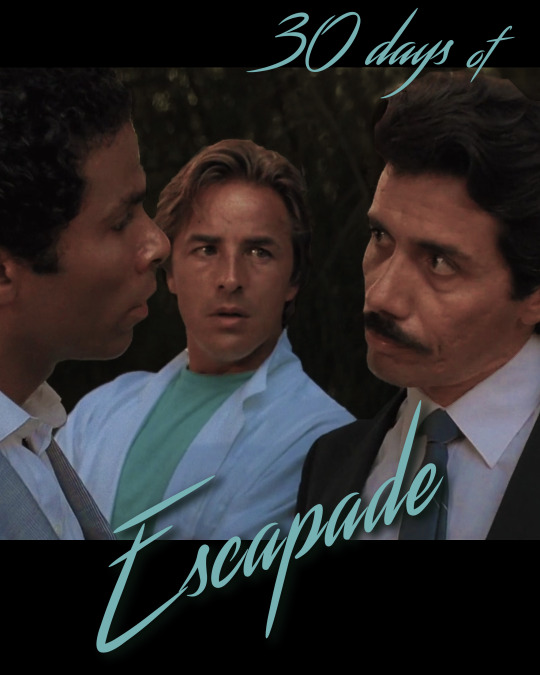
Fuck branding and consistency: For my precious Miami Vice, we’re going full 80s!
Miami Vice is a cop show from the 80s that helped usher in an era of neo noir and radically altered how television is cut and scored. It is both an ensemble crime show and a buddy cop show. The central duo are Sonny Crockett (Don Johnson, center) and Ricardo Tubbs (Philip Michael Thomas, on the left). They start out pointing guns at each other and end up best friends... with a detour through amnesia and attempted murder along the way.
Their boss, Martin Castillo, is played by Edward James Olmos, who has had the exact same death glare for his entire career as you can see above. Rounding out the main ensemble were two comic relief guys, Switek and Zito, and two women, Trudy Joplin and Gina Calabrese.
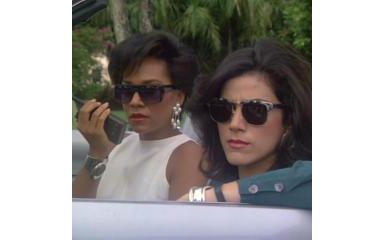
Yes, they’re super hot, and I ship them too, along with the very obvious Crockett/Tubbs, but that is... not what the fandom shipped. More on that later.
MV had only a medium size fanfic fandom. As a source of annoying middle aged men who own that speedboat and still don’t wear socks, however, it is unparalleled. It was a mega-hit in its day but is largely ignored now.
As far as I can tell, the height of the slash fandom was just after the show ended, around the time Escapade was getting going. It was something that was in the air (hah) at the time but not popular enough to make it onto the program much. There were a scattering of vids and panels in that era, including:
1992 - Miami Vice (cops and music, right, well, maybe there's a little more here...)
Indeed there was, but you won’t find that out from most people! The cultural osmosis version of this show is deeply offensive to me, far worse than “womanizer Kirk” and its ilk.
I. How I got into the fandom
Miami Vice is a brilliant show, so far ahead of its time that it instantly dated itself and has been a subject of constant mockery by people who only know it vaguely from cultural osmosis during the 90s. Its revolutionary editing is what inspired me to go back to film school. Its cinematography is equally iconic. The soundtrack literally changed television forever. And no, children, synthesizer is not automatically a bad or cheesy instrument. Jesus.
I got into MV in 2010. I’d been reading about it in the first Film Noir Reader and had been intrigued by the black and white stills. I looked it up and found that it was a rare DVD release that secured all of the music rights, unlike the butchery of Wiseguy and too many other shows. I bought it on the spot.
It was a religious experience.
By 2010, even the little Yahoo Groups fandom it had eventually grown was long gone. The zine fandom certainly was. I started buying all of the used zines I could get my hands on. One thing stood out to me over and over: Rico, my favorite character, does have great fic, but it’s all gen and het. The slash zines treated him with absolute contempt. The only fan from the 90s slash fandom who had any clue how to write him was @flamingoslim.
So I did what any fan would do: I got into her current fandom, Starsky & Hutch, and stalked her to her S&H con.
What?
II. Why didn’t fandom love Rico?
So why were the slash zines like that? Yes, okay, the answer is racism.
But the more zines I read and the more oldschool fans I’ve talked to, the more apparent it is that the way it played out is specific and interesting, not some generic “he’s not hot” thing. The big problem was that the slash zines came from a tiny handful of publishers, with the more popular ones coming from a single publisher. Looking at their editorials in the front of volumes, I see cartoons of the two of them dressed as their ship, Crockett/Castillo. I’m getting full on otherkin vibes from how they talk about that ship.
This was very clearly a case of hating the other man who got in the way of the OTP. Even so, the particular way Rico was written in many of the stories in those zines is incredibly racist. Flamingo writes him as a supportive best friend to Crockett. This was... not the norm.
This wouldn’t be such a big problem except that this was not an era when you just go on AO3 or even FFN and post whatever you want. Getting a zine together is hard. It takes money. It means finding a printer that is willing to print gay shit--something that can still be an issue in 2020. It means having a job and a lifestyle where being outed as a publisher of gay shit will not fuck you over. They were the only game in town, and their bad takes ruled the fandom.
Contrast to the gen/het zines: Rico wasn’t specifically more popular than other characters, but he wasn’t in the way of somebody’s OTP, so he shows up pretty often as a major character, written similarly to how he is in canon.
The gen/het zines are also just plain well written, making all of the characters more nuanced and interesting than in a lot of the slash fic. That’s what happens when you’re dealing with tiny fandoms and tiny numbers of writers: one or two great talents shape the whole feeling.
The other answer to why people weren’t super into Rico is simple: Castillo.
MV is a show full of buddy duos. And then there is the boss, a mysterious lone wolf whose identity only goes back a handful of years. He is aggressively moral and incorruptible, yet also executes a counter-revolutionary in cold blood rather than let the CIA take him back to South America to continue his reign of terror.
What, you think Castillo isn’t a murderer?
Hate to break it to you, but not only is he, but Rico is the one who found out and never reported him. It’s one of the most interesting moments between them.
I’m not surprised fandom wanted to ship Castillo with someone. I just wish people hadn’t only ever reached for Crockett/Castillo when Castillo/Tubbs has just as much great material. But if I get started on my ship manifesto for that, we’ll be here all day!
Suffice it to say that MV suffers from what lots of old fandoms do: people only rewatch certain parts, and it’s hard to remember which bits are fanon.
I’ve heard people say that Rico didn’t seem like he really cared about Sonny on the same level that the oldschool slash juggernauts did. I think this is a combo of not rewatching the episodes more heavily focused on him and of fandom liking a particular kind of woobie/enabler ship. Rico usually caved in the end, but he set boundaries in a way some of these ships never did. He was also portrayed with a particular kind of bragging confidence that is way more common in black characters. I think it reads wrong to some people, though in fact, he’s just as much of a ride-or-die bestie as the usual slash duos from back in the day.
The same thing happens with a lot of specific moments fic does heavily reference. Many significant Crockett/Castillo moments involve Crockett being the only one who can get through to Castillo, yet in those actual scenes, it’s Tubbs who does or it’s both Crockett and Tubbs.
Yes, friends who I will be seeing at Escapade, even that scene and also that one. You are just flat out wrong.
III. The Fanworks
First, my eternal rec. It’s het with an OFC. No, no, come back! MV was one of those fandoms where this was sometimes the best fic, and all the more so since the ship is with Castillo, he of the mysterious past and not enough personal connections.
Dark Side of the Moon by @dejlah
I also really love Temper of Revenge by Mary Van Deusen. It’s one of three she did to the same song and it’s about the dark, dark ending for the comedy relief duo. If you’ve heard Francesca Coppa talk about vidding history, you’ll have heard of this vid. (No, we’re still not the same person.)
youtube
I’m also a big fan of MVD’s Crockett/Castillo vid, Ready for the Times. It manages to perfectly capture the dominant fanon take on the ship. I can’t even put into words exactly why, but it brought back all that fic powerfully.
youtube
This fan-made trailer does a good job of showing the kinds of twisty episodes he got:
youtube
My first vid I ever sent to Vividcon was a Gina/Trudy one that gives a good sense of the awesome costumes and also how often they had to go undercover as hookers. (AO3)
youtube
And finally, for those of you who don’t want to watch five whole seasons of 80s TV, I vidded that arc. (AO3)
youtube
Wow, this is only like 15 screens. Practically a haiku when it comes to me talking about Miami Vice!
63 notes
·
View notes
Text
Memories : Top 15 Films of 2020

If 2020 taught movie fans anything, it was that we shouldn’t take things for granted. On the dollars and cents side of things, movie theaters were already facing an uphill battle to stay sustainable, but the “shelter-in-place” practice of March and beyond decimated box office returns, with many theaters yet to reopen (if they will open at all). In terms of famous names and faces, the list of those who passed away featured numerous icons : Kobe Bryant, Kirk Douglas, Max von Sydow, Honor Blackman, Carl Reiner, Ennio Morricone, John Saxon, Wilford Brimley, Chadwick Boseman, Sean Connery, Tiny Lister Jr., Adolfo ‘Shabba Doo’ Quinones and many more transitioned to the great beyond. Netflix, Hulu, Amazon Prime, Shudder and a number of other streaming services saw themselves step into the forefront of the entertainment provider realm, with Warner Brothers and a handful of other studios making announcements that they will be following suit for at least 2021, if not for good.
With all of this uncertainty and chaos, however, the year 2020 was a surprisingly strong one, in my opinion, when it came to cinematic output... so much so, in fact, that aside from a number of Honorable Mentions, my list of top films was expanded to 15 in order to accommodate all of my choices. For anyone who has checked out my lists from previous years, you will know that I did not see every film released this year, but I did make my best effort to cover as wide a range of films as possible. Enjoy the list, and be sure to support film in whatever medium you are able to moving forward so that it can thrive.
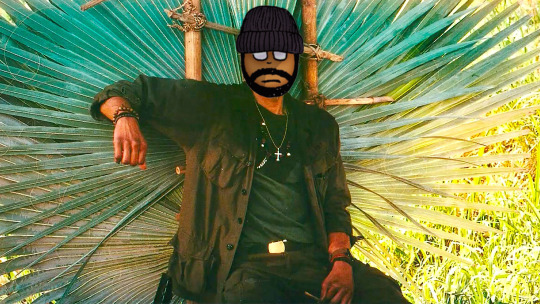
HONORABLE MENTIONS
The 40-Year-Old Version (dir. Radha Blank) A nice little personal film that spoke to my hip-hop sensibility, as well as that ever-present awareness of the inevitability of age, and how it can skew our perspective in regards to our achievements.
Ava (dir. Tate Taylor) This isn’t the action film that’s going to reinvent the wheel, but if you look at action films like wheels, this is a quality wheel. Outside of Common, I couldn’t really find much to shoot down... this will definitely be one I consider the next time I have company and we’re looking for something fun to check out.
Bill & Ted Face The Music (dir. Dean Parisot) I honestly would have been satisfied with just two films in this franchise, but surprisingly, a third entry was created that didn’t ruin my overall enjoyment of the previous two films. Keanu Reeves and Alex Winter jumped in without missing a beat, a healthy dose of familiar faces popped back up, and the new cast additions weren’t too jarring... it’s nice to know that a pair of my favorite childhood films are officially now part of a trilogy.
Borat Subsequent Moviefilm: Delivery of Prodigious Bribe to American Regime for Make Benefit Once Glorious Nation of Kazakhstan (dir. Jason Woliner) This was possibly the most surprising release of 2020... outside of a couple of news blips that Sacha Baron Cohen made during production, not a lot about this film was leaked prior to its release. For such a dated character and a seemingly outdated style of humor, Borat once again exposed the simplest parts of society in an incredibly insightful (albeit cringey as all get-out) manner.
Guns Akimbo (dir. Jason Lei Howden) One of the most fun films of 2020. Somewhere, the creative minds behind Nerve are wishing that they’d made this film instead.
Henrietta and Her Dismal Display of Affection (dir. Jeffrey Garcia) Jeffrey Garcia is the homie, and I’ve had the pleasure of being in a number of his short films, so when he announced his intentions to write and shoot a feature film in 2020, I was completely on-board. Miraculously, he was able to film the movie while the world was being ravaged by COVID-19, and though I cannot publicly announce details yet, this film has definitely already met (and likely succeeded) his expectations.
The Midnight Sky (dir. George Clooney) With each film that George Clooney directs, I realize more and more than he is an old soul trapped in a body idolized by the new school of film. That being said, it’s nice to know that there are directors out there willing to embrace patient, silent and contemplative moments while simultaneously withholding from force-feeding viewers exposition.
Tenet (dir. Christopher Nolan) This was possibly the most anticipated release of the year, considering it was the king of the IMAX release crowd in its pre-release promotion. After a small delay due to COVID-19, it was one of the first films released in hopes of testing the movie-going waters during what was sure to be a diminished period of time, which probably hurt its numbers. Too many, the film was confusing, and the nit-picking was fierce from the criticism contingency, but in all honesty, this was pretty impressive Nolan fare... certainly a good second movie in a Nolan double feature.
The Trial of the Chicago 7 (dir. Aaron Sorkin) I cannot tell a lie... I was hugely impressed with how Sorkin managed to reel his personality and voice back in order to let this well-known, controversial moment in time present itself. Sorkin has a tendency to be the star of his films, be it when he is in the writer or director role, but for this film, he managed to focus the best parts of his skillset into a highly respectful, educational and inspiring tale that fit the tumultuous summer we endured.
VHYes (dir. Jack Henry Robbins) I remember seeing this trailer as 2019 was coming to a close, and it was a film high on my list of desired viewing. Then 2020 reared its ugly, stupid head and many releases disappeared into obscurity or found themselves delayed. Luckily, this one slipped through the cracks and found a home in the streaming world, which in all honesty, suited its presentation very well. One of the most delightfully weird films of the year, hands down.
Vivarium (dir. Lorcan Finnegan) Of all the films cut from my Top 15 list, this was the toughest cut to make. I went into the film totally blind (with Jesse Eisenberg and my respect for his acting chops being the sole selling point), but this film really hit a lot of my buttons... it’s trippy as can be, there is a character that is freakishly unique and wholly unnerving, and the production design leaves a lasting impression. Don’t let the Honorable Mention designation fool you... this one is a winner.
Wonder Woman 1984 (dir. Patty Jenkins) The Christmas gift that the masses collectively decided that they did not want. Much like Ava, there is one glaring aspect of this film that I could have done without, but otherwise, I found this to be an enjoyable film. Gal Gadot was made for this role, while Kristen Wiig and Pedro Pascal stepped up to the plate and impressed. If you’re looking to be blown away, the Wonder Woman franchise isn’t the smartest place to go, but if you’re looking for entertainment, there’s plenty of it here.
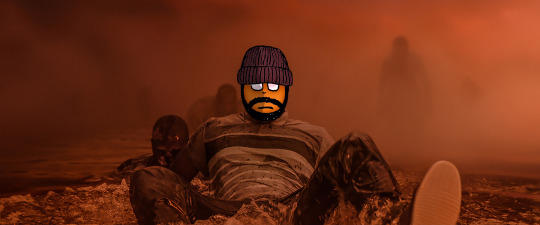
THE TOP 15 FILMS OF 2020
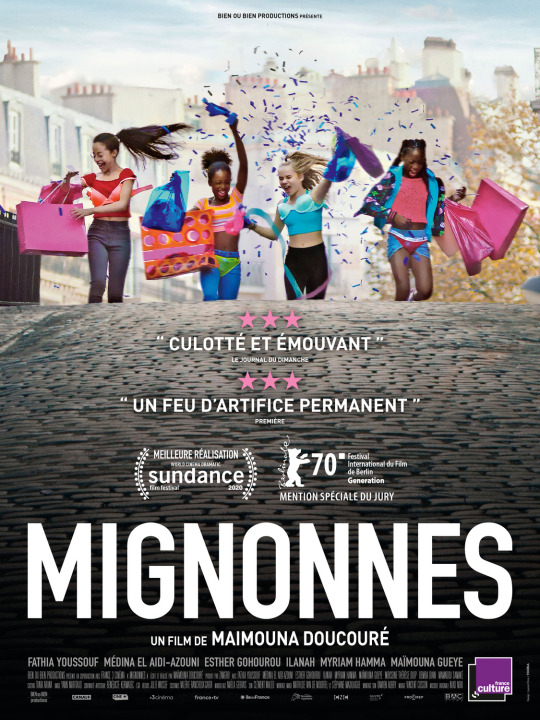
15. Mignonnes (dir. Maïmouna Doucouré) This one started off the year with plenty of controversy. What was an award-winning tale about womanhood and the difficulties surrounding coming of age in an ever-changing and evolving world quickly devolved into a campaign to ban the film (and Netflix). Many people overlooked the film as a cautionary tale about what access to the Internet and the sexually-charged nature in which women are portrayed can do to developing girls, instead choosing to accuse the film of being fodder for malicious types seeking to exploit the sexualizing of young women. More than anything, in my opinion, Mignonnes served as an example of our outrage-fueled culture and the way it tends to skew our perspective and/or our ability to take art at face value.
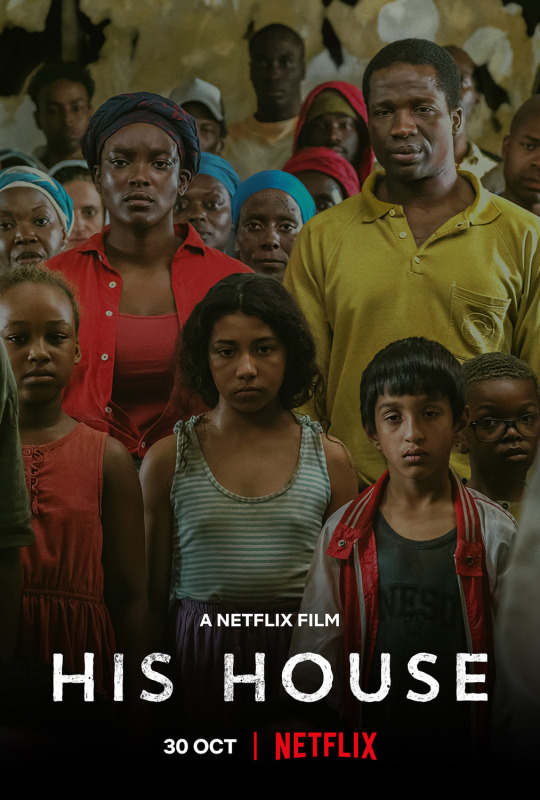
14. His House (dir. Remi Weekes) As I’ve mentioned many times over the past week or so on this blog, horror films were one of the few genres that found a benefit from the film industry’s transition to streaming services for primary access to film. While a number of traditional horror films received notice, His House took the opportunity to not only make a pure horror film, but one that spoke on racism and the conditions that asylum-seekers and refugees face. The film is well-acted, the production value is high quality, and it’s paced beautifully... while not the highest film on this list, it is certainly one I will encourage others to see as time goes by.
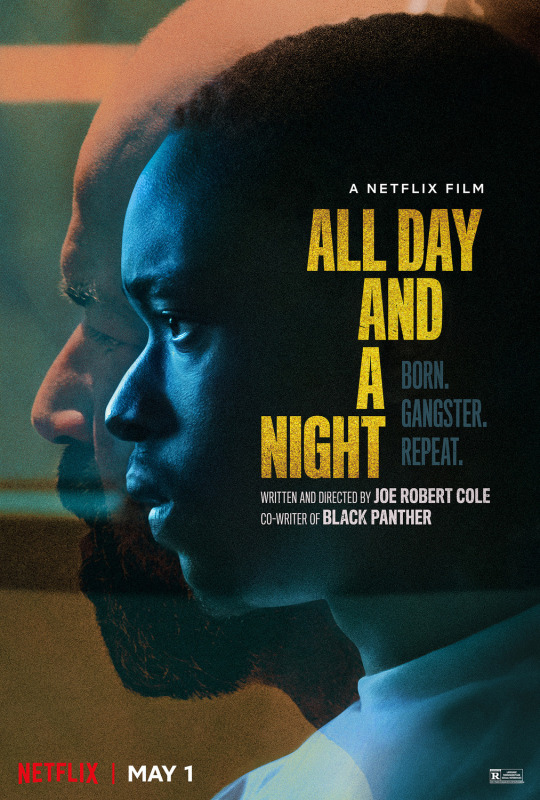
13. All Day and a Night (dir. Joe Robert Cole) When human nature reared its ugly head during COVID-19 in the form of numerous race-related killings, multitudes of businesses quickly adopted the Black Lives Matter mantra, with film distributors and streaming services taking advantage of the moment to produce and release content relevant to cultural and social awareness. Netflix was no different, and of the many films they released in the wake of the harrowing events, All Day and a Night is the one that feels the most sincere and honest in its approach and presentation. The streets of Oakland are presented with a vast array of characters, each with complex backgrounds and states of mind, all of which helps the viewer understand the pressure many minorities live with and process on a daily basis.
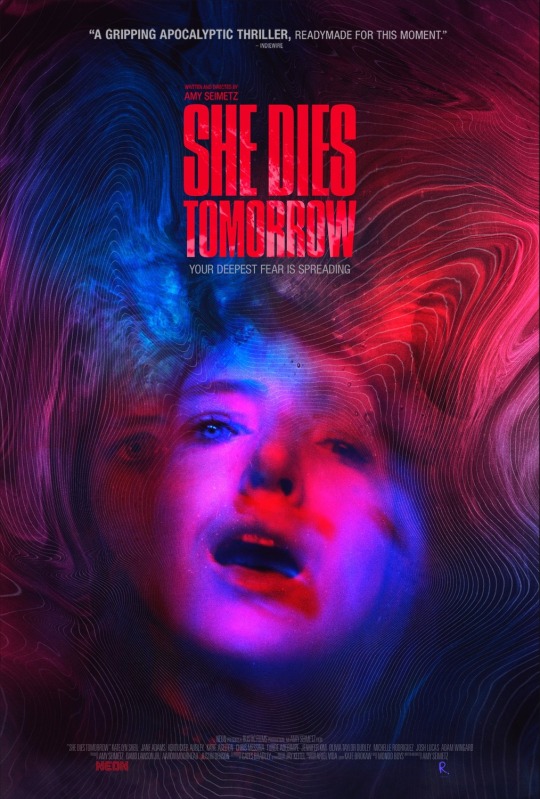
12. She Dies Tomorrow (dir. Amy Seimetz) Execution is king, even when applied to the simplest of premises, and She Dies Tomorrow is a shining example of this. In a very John Cassavetes move, director Amy Seimetz took her payment from her appearance in Pet Sematary and used it to fund a personal project that more than likely would have been ignored by studio heads. The result is a hypnotic, entrancing and haunting film where stillness and anticipation play antagonist, while we as viewers feel the need to transpose ourselves into the protagonists we are presented due to their stilted but emotional performances. Hopefully this one finds some notoriety in the cult classic realm as the years pass.
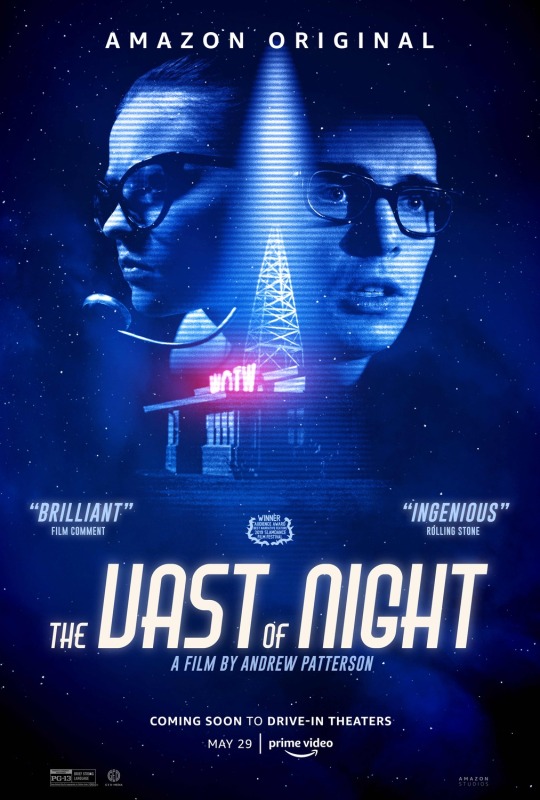
11. The Vast of Night (dir. Andrew Patterson) For a debut film, The Vast of Night handles itself with a surprising amount of confidence in its vision. The immersion is nearly instant as we are first placed in the premise of a TV show, and then a 1950′s town, but once the actors and camera get going, it’s up to us as viewers to strap in for the ride. The story is deeply intriguing, the performances are strong enough to carry a very dialogue heavy movie, and the final act is chilling in its reveals. I will be surprised if this one finds its way to a Best Original Screenplay nomination due to it being a debut film from a relatively unknown writer/director, but if it manages to get the nomination it will certainly be a well-deserved one.
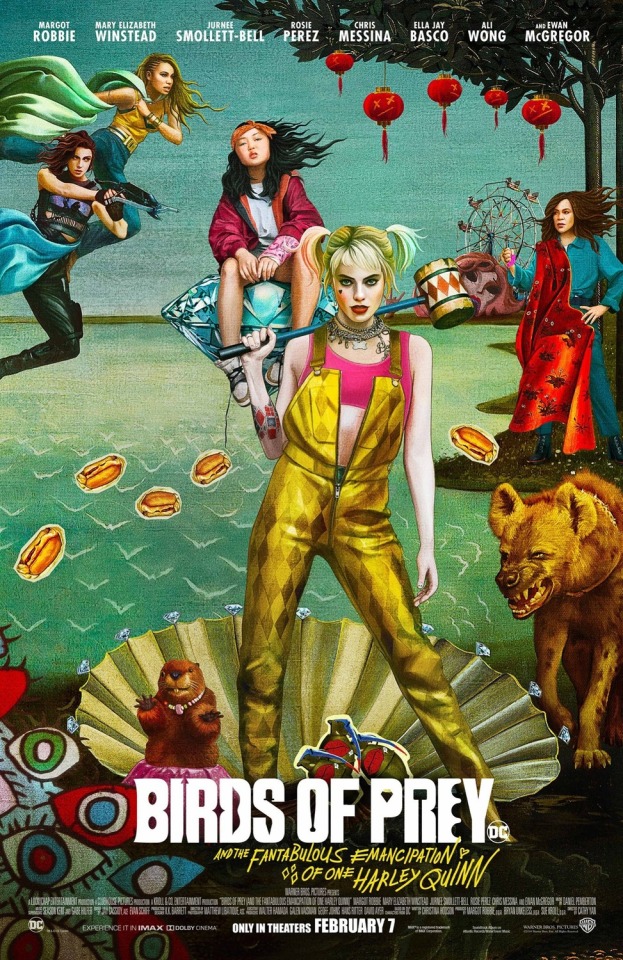
10. Birds of Prey (and the Fantabulous Emancipation of One Harley Quinn) (dir. Cathy Yan) The movie that broke the list. If someone would have told me in 2019 that a film directly connected to Suicide Squad would be anywhere on a Top Films list I curated, I would have laughed dead in their face, and yet, here we are. It’s like every good idea that was poorly executed in Suicide Squad found new life in Birds of Prey, which makes the film not only an entertaining watch, but a satisfying one. Not only is Margot Robbie perfect in this film (as well as given a break on the exploitative costuming), but Mary Elizabeth Winstead arguably takes a stab at stealing the show with her performance. Don’t let the DCEU association fool you... Birds of Prey is the real deal.

9. Never Rarely Sometimes Always (dir. Eliza Hittman) Probably the most contemplative film on the entire list, and impressive in its nature for sure. To my knowledge, the cast is made up of mostly unknowns (unless I’m sleeping on actors and actresses, which has been known to happen), and as a result, a tough slice of life to swallow is presented in an extremely grounded nature. Sidney Flanigan gives a powerful performance, hopefully the first of many.
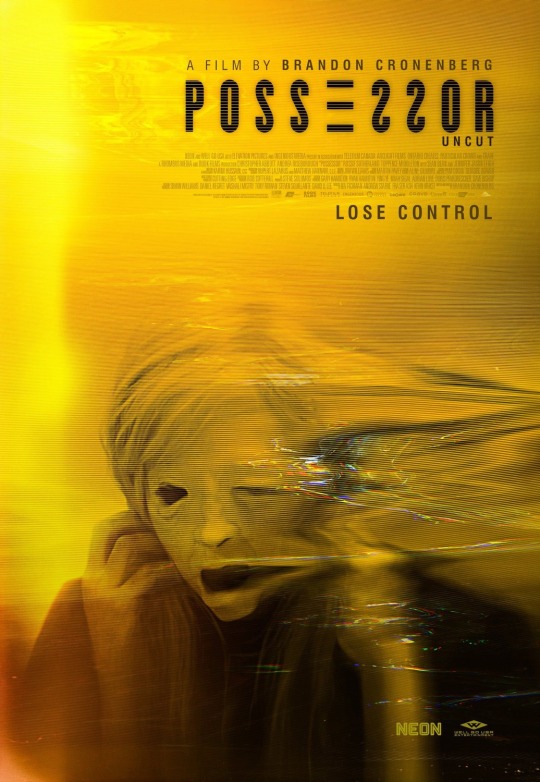
8. Possessor [Uncut] (dir. Brandon Cronenberg) Easily the most “what the f-ck” film on this list, and certainly one worthy of the Cronenberg name. Andrea Riseborough has been on my radar since Birdman or (The Unexpected Virtue of Ignorance) and Mandy, and seeing her in a lead role confirms her talent. I’m a sucker for science-fiction films that don’t rely on digital effects and elaborate set pieces, and Possessor rings both of those bells with a vengeance. I watched the uncut version, which has a couple of extremely brutal sequences that will unnerve even the most hardened viewer, but these sequences only serve to drive home the lost nature of Tasya, our protagonist. This one isn’t for everyone, but for those who can stomach a bit off graphicness and process a narrative that doesn’t spoon-feed you answers, this one is a must see.
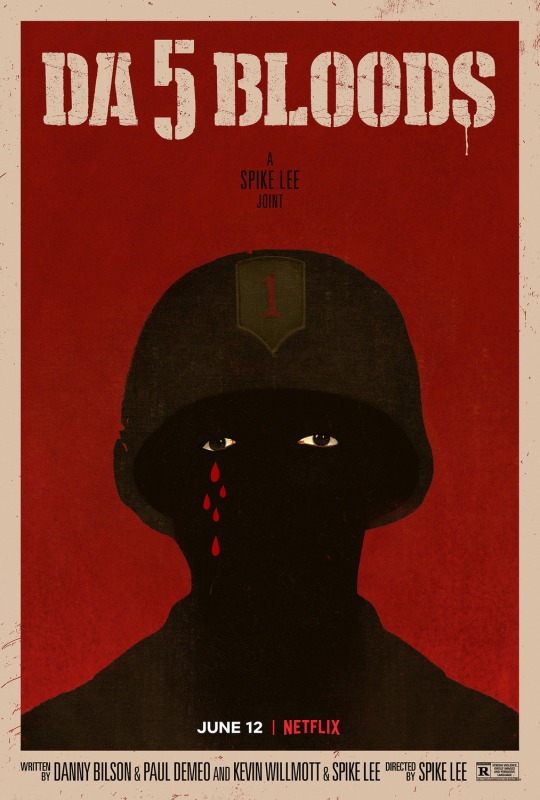
7. Da 5 Bloods (dir. Spike Lee) Spike Lee has always been a huge influence on me as both an aspiring filmmaker and a fan of the medium, but I’d be lying if I told you that his last decade was a memorable one. Outside of BlacKkKlansman, Lee has found himself falling short of his vision more often than not, but Da 5 Bloods is a tonal and stylistic bullseye. Fans of Lee will dig it, fans of Vietnam films will dig it, and anyone who had an inkling of respect or admiration for Chadwick Boseman will be moved. If Lee continues to make films as good as this one, he may find an entirely new generation of fans as a result.
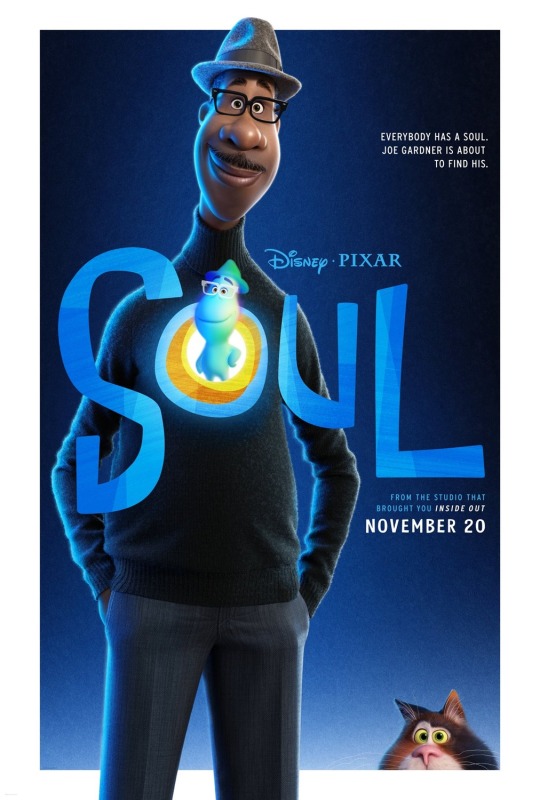
6. Soul (dir. Pete Docter) As mentioned at the top of this list, people love to try and sink films due to their own personal agendas, and Soul found itself in the crosshairs prior to its late 2020 release. Many people were upset that a minority character would not only spend most of the movie as a blue blob, but would also seemingly serve as a tool for another character’s “salvation”. That being said, once Soul dropped, anybody with common sense dropped those stances and realized that Pixar had not only made a stunningly beautiful film, but one that likely spoke to adults more than children. Plain and simple, Soul is a bonafide instant classic.

5. Kajillionaire (dir. Miranda July) If Evan Rachel Wood doesn’t win an Oscar for her performance in Kajillionaire (or at least garner a nomination), Hollywood needs to collectively have their head checked. Every year worth its salt has a weird, quirky but loveable film, and Miranda July more than succeeded in making one for 2020. The humor, both physical and dialogue-based, is on point, and the bittersweet nature of the story is gut-wrenching as the film progresses. This one was probably the biggest surprise for 2020 in terms of prior awareness versus post-watch admiration.
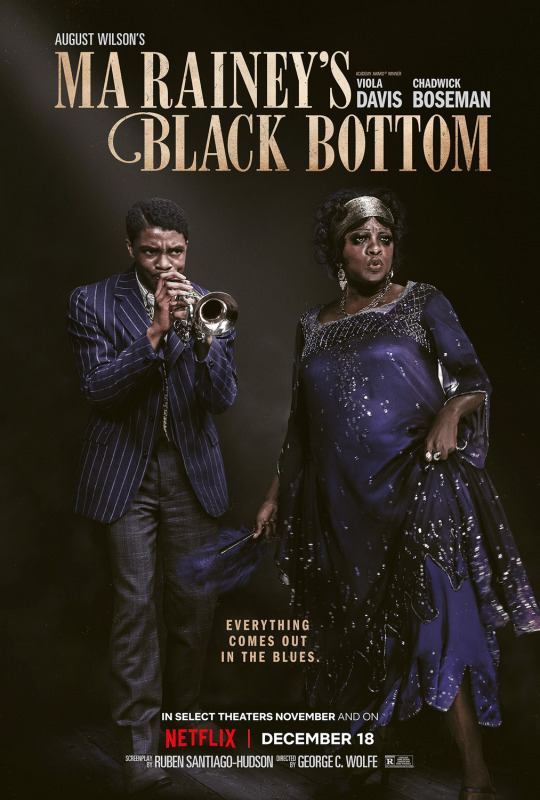
4. Ma Rainey’s Black Bottom (dir. George C. Wolfe) The final film of Chadwick Boseman’s short but prolific career is one that allowed him to exist in the wake of his reality, making his performance powerful and (seemingly) cathartic. He is surrounded by supreme talent on all sides, as there are no weak performances in this film, and despite it essentially being a play shot for film, it feels far from limited, contained or constrained. Not only does it speak on larger issues of the commodification of Black pain and talent, but it may serve as a vehicle for a posthumous Oscar for Boseman.
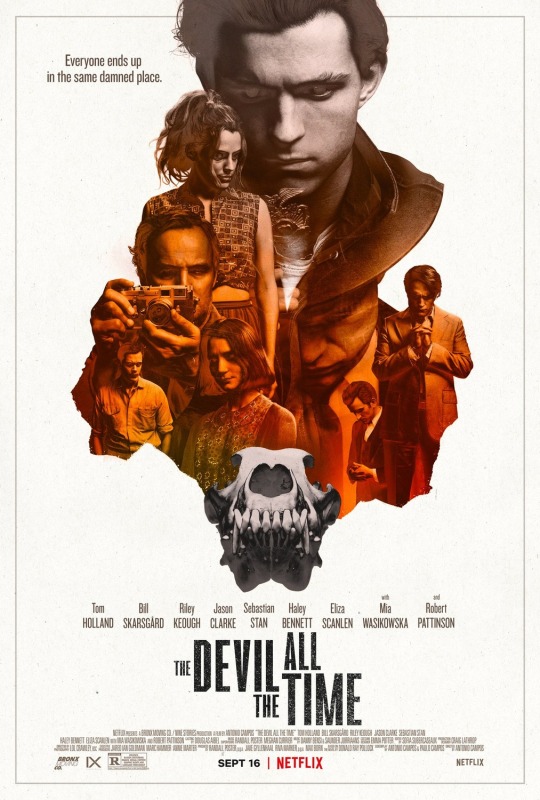
3. The Devil All The Time (dir. Antonio Campos) This was the first Netflix original that made me really and truly respect them as a film distributor. The list of talent for The Devil All The Time is truly impressive, and Tom Holland knocked his lead role out of the park. Robert Pattinson is great as always, and the way that the story winds back into itself keeps you locked in and connected until the credits roll. For something that came out so many months ago, it’s respectable that it was able to hold such a high position on a list that was as fluid as any I’ve ever put together.
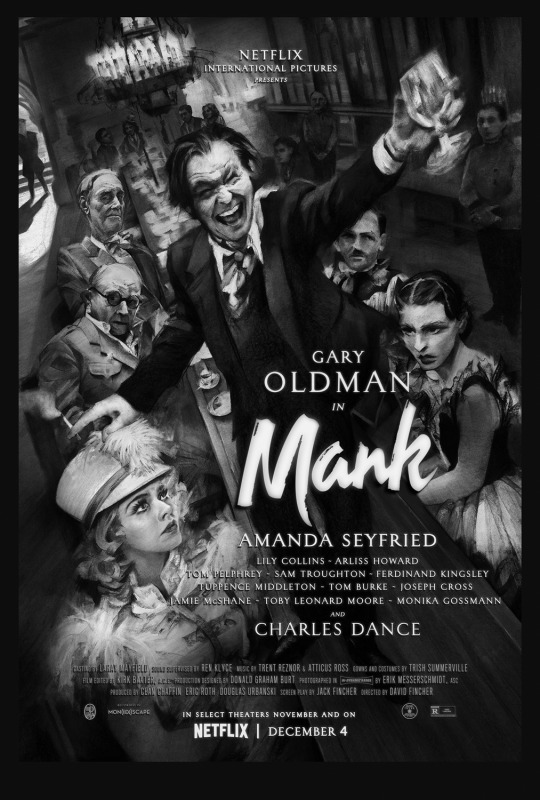
2. Mank (dir. David Fincher) For a time, this was the hands down film of the year on my list. Gary Oldman has basically become a “can do no wrong” actor, and his performance was amplified by David Fincher’s ability to emulate the look, sound and feel of a bygone Hollywood era. On top of this, the built in intrigue that comes with handling anything remotely connected to Orson Welles is present, making Mank almost feel like a companion piece to the prolific film that is Citizen Kane. If The Devil All The Time was a victory for Netflix, then Mank was the win that put them into a true spot as contenders in the future of film distribution.
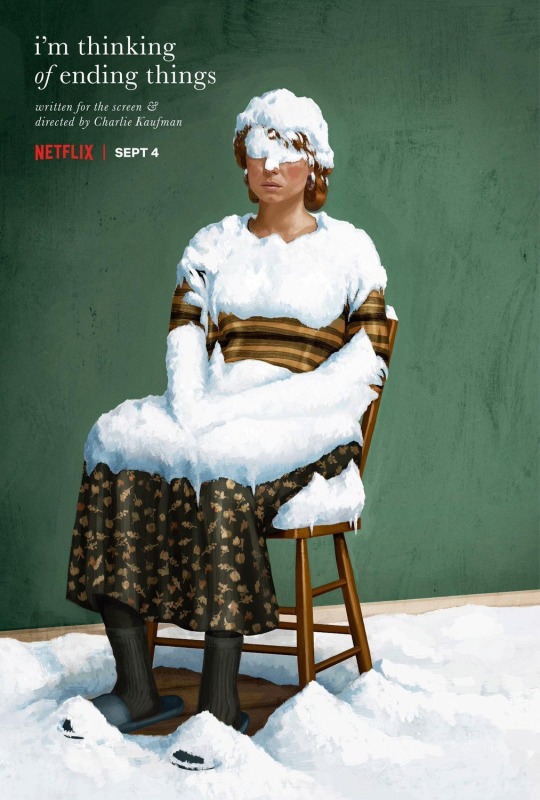
1. I'm Thinking of Ending Things (dir. Charlie Kaufman) Where does one even begin with Charlie Kaufman? Time and again, he proves to be one of the most truly unique voices to gain fame. For I’m Thinking of Ending Things, Kaufman seemingly returns to his foundation of odd, offbeat love stories, only to take us on a journey of truly mind-bending and psyche-warping proportions. Of all the movies on this list, this is the one that almost demands repeat viewings, as one must have an idea of the entire journey before they can understand the individual aspects laid out. If dialogue isn’t your thing, then this one may not hold you, but that would be a shame, as this beautiful mystery stands head and shoulders above the rest of 2020′s stellar output.
#ChiefDoomsday#DOOMonFILM#Mignonnes#MaimounaDoucoure#HisHouse#RemiWeekes#AllDayAndANight#JoeRobertCole#SheDIesTomorrow#AmySeimetz#TheVastOfNight#AndrewPatterson#BirdsOfPreyAndTheFantabulousEmancipationOfOneHarleyQuinn#CathyYan#NeverRarelySometimesAlways#ElizaHittman#Possessor#BrandonCronenberg#Da5Bloods#SpikeLee#Soul#PeteDocter#Kajillionaire#MirandaJuly#MaRaineysBlackBottom#GerorgeCWolfe#TheDevilAllTheTime#AntonioCampos#Mank#DavidFincher
6 notes
·
View notes
Text
Star Trek Villains Who Actually Had a Point
https://ift.tt/3t8D3MQ
This article contains spoilers for various parts of the Star Trek franchise.
Last fall, airing just a few weeks apart, both Star Trek and Star Wars debuted season premieres of new streaming TV episodes in which the heroes of each show had to fight a giant, legless worm-monster. In Star Trek: Discovery’s “That Hope Is You Part 1,” it was the deadly Tranceworm, while The Mandalorian’s “Chapter 9: The Marshall” had the murderous Krayt Dragon. The differences between the Final Frontier and the Faraway Galaxy could not have been made clearer by these dueling beasts: in Mando, the plot involved killing the monster by blowing up its guts from the inside, while in Disco, Book taught Michael Burnham how to make friends with it.
The Trek universe deals with the concept of evil a little differently than many of its famous genre competitors. There is no Lex Luthor of the Federation. Palpatine doesn’t haunt the planet Vulcan. The Klingons have no concept of “the devil.” (At least in The Original Series.) This isn’t to say Trek doesn’t have some very memorable Big Bads, it’s just that most of the time those villains tend to have some kind of sympathetic backstory. Even in the J.J. Abrams films!
So, with that in mind, here’s a look at seven Star Trek villains who maybe weren’t all bad, and kind of, even in a twisted way, had a point…
Harry Mudd
In Star Trek: The Original Series, Harry Mudd was presented as a straight-up con-man, a dude who seemed to be okay with profiting from prostitution (in “Mudd’s Women”) and was also down with marooning the entire crew of the Enterprise on a random planet (in “I, Mudd”). He’s not a good person. Not even close. But, he does make a pretty could case against Starfleet’s lack of planning. In the Discovery episode “Choose Your Pain,” Mudd accuses Starfleet of starting the war with the Klingons, and, as a result, putting the larger population of the galaxy at risk. “I sure as hell understand why the Klingons pushed back,” Mudd tells Ash Tyler. “Starfleet arrogance. Have you ever bothered to look out of your spaceships down at the little guys below? If you had, you’d realize that there’s a lot more of us down there than there are you up here, and we’re sick and tired of getting caught in your crossfire.”
Seska
At a glance, Seska seems pretty irredeemable. She joins the idealistic Maquis but is secretly a Cardassian spy. Once in the Delta Quadrant, she tries to screw Voyager as much as possible, mostly by hooking up with the Kazon. That said, Seska is also someone caught up in hopelessly sexist, male-dominated power structures and does what she has to do to gain freedom and power. The Cardassian military isn’t exactly enlightened nor kind, so the fact that Seska was recruited into the Obsidian Order in the first place certainly explains her deceptive conditioning. You could argue that Seska could have become a better person once she had Captain Janeway as an ally, but, the truth is, she was still a spy caught behind enemy lines, but suddenly without a government to report back to. So, Seska did what she had to do to survive, even lying to Chakotay about having his child. The thing is, again, outside of Starfleet, Seska is at the mercy of the sexist machinations of the Kazon, so again, she’s kind of using all the tools at her disposal to gain freedom. Had Voyager not gone to the Delta Quadrant, and Seska’s villainy may have been more clear-cut. But, once the reason for her espionage becomes moot, her situation gets more desperate, and, on some level, more understandable.
Charlie Evans
In The Original Series, Kirk loves telling humans with god-like powers where to shove it. In “Where No Man Has Gone Before,” he phasers Gary Mitchell and buries him under a rock. But, in “Charlie X,” when teenager Charlie Evans also gets psionic powers, Kirk does a less-than-a-great job of being a good role model. For most of the episode, Kirk tries to avoid become Charlies’ surrogate parent, and when he does try, it results in an embarrassing overly macho wrestling match featuring those famous pink tights.
Read more
TV
How Star Trek: The Next Generation’s Killing of Tasha Yar Became an Awkward Mistake
By Joseph Baxter
TV
Why Star Trek Needs More Characters Like Captain Lorca
By Lacy Baugher
Charlie was a deeply troubled human being, and there was no justification for him harassing the crew and Janice Rand in specific. But, angry, kids like Charlie have to be helped before it gets to this point. Kirk mostly tried to dodge the adult responsibility of teaching Charlie the ropes, and only when some friendly aliens arrived, did everyone breathe a sigh of relief. But, don’t get it twisted, those aliens are basically just social workers, doing the hard work Starfleet is incapable of.
The Borg Queen
Because the origin of the Borg Queen has dubious canonical origins, all we were told in Voyager is that she was assimilated as a child, just like Seven of Nine. As Hugh and Jean-Luc discuss in the Picard episode “The Impossible Box,” basically, everyone assimilated by the Borg, is, on some level, a victim. The Queen was never presented this way in either First Contact or Voyager, but, at one point, writers Judith and Garfield Reeves-Stevens had pitched a story for Enterprise which would have featured Alice Krige as a Starfleet medical technician who made contact with the Borg.
Because both Alice Krige and Susanna Thompson played the Borg Queen, it’s possible the backstories of each Queen is different and that maybe they aren’t the same character. Either way, assuming the Borg Queen retains some level of autonomy relative to other drones (likely?) then she’s pretty much making the best of a bad situation. In fact, at the point at which you concede the Borg are unstoppable, the Queen’s desire to let Picard retain some degree of his independence as Locutus could scan as a kind of mercy. The Borg Queen actually thinks she and the Borg are making things simpler for everyone. And with both Data and Picard, she tried to make that transition easier and, in her own perverse way, fun too.
Ossyra
Yes, we saw Ossyra feed her nephew to a Trance worm, and we also saw her try to kill literally everyone on the USS Discovery, including Michael Burnham. However, in the middle of all of that, Ossyra did try to actively make peace between the Emerald Chain and the Federation. And, most tellingly, it was her idea. Ossyra also pointed out one of the most hypocritical things about the United Federation of Planets: the fact that Starfleet and its government rely on capitalism without actively acknowledging it. Essentially, Ossyra was saying that the ideals of the Federation are great, but the Federation has all kinds of dirty little secrets it doesn’t want to talk about. In her meeting with Admiral Vance, pretty much everything she said about the Federation was true—and her treaty proposal was fair.
Read more
TV
Q’s Return on Star Trek: Picard Season 2 will Follow “Significant Trauma”
By Joseph Baxter
TV
Why Star Trek: Discovery Needed to Write Out Its Klingons
By Lacy Baugher
The only snag: she wouldn’t turn herself over as a war criminal. Considering the fact that the Federation made Mirror Georgiou into a Section 31 agent, despite her war crimes in another universe, this also seems hypocritical. Why not just do the same thing with Ossyra? Tell everyone she’s going to prison for war crimes, but make her a Section 31 agent instead? Missed opportunity!
Khan
Khan was genetically engineered by wacko-a-doodle scientists at the end of the 21st Century. At some point on Earth, he became a “prince” with “power over millions.” But, as Kirk notes in “Space Seed,” there were “no massacres” under Khan’s rule, and described him as the “best of the tyrants.” Kirk’s take on Khan in “Space Seed” is basically that Khan was an ethical megalomaniac. Most of what we see in “Space Seed” backs this up. Khan doesn’t actually want to kill the crew, and stops short of doing it when he thinks he can coerce them instead. His only focus is to gain freedom for himself and his exiled fellow-Augments. In the Kelvin Universe timeline, Khan’s motivations are similar. Into Darkness shows us a version of Khan who, again, is only cooperating with Section 31 because he wants freedom for his people. Sure, he’ll crush some skulls and crash some starships to get to that point, but in his dueling origin stories, Khan is, in both cases interested in freedom for his people, who, are by any definition, totally persecuted by the Federation.
Khan is still a criminal in any century. But, we only really think of him as a villain because he goes insane in between the “Space Seed” and The Wrath of Khan. The Khan of The Wrath is not the same person we met in “Space Seed.” As he tells Chekov, “Admiral Kirk never bothered to check on our progress.” Had Kirk sent a Starfleet ship to drop in on Khan and his “family” every once in awhile this whole thing could have been avoided. In the prime timeline, Khan goes nuts because Ceti Alpha VI explodes and nobody cares. In the Kelvin timeline, Admiral Marcus blackmails him. Considering that Khan is Star Trek’s most famous villain, it’s fascinating that there are a million different ways you can imagine him never getting as bad as he became. In “Space Seed,” he and Kirk basically part as friends.
Q
In “Encounter at Farpoint,” Q accuses humanity of being “a savage child race.” And walks Jean-Luc Picard through the various atrocities committed by humanity, through the 21st Century. Picard kind of shrugs his shoulders and says, “we are what we are and we’re doing the best that we can.” When we talk about the philosophy of Star Trek, we tend to give more weight to Picard’s argument: the idea that by the 24th century, humanity has become much better, in general than it is now. But, the other side of the argument; that there’s a history of unspeakable violence and cruelty baked into the existence of humanity, is given less weight. We don’t really listen to Q when he’s putting humanity on trial, because we can’t see his point of view.
cnx.cmd.push(function() { cnx({ playerId: "106e33c0-3911-473c-b599-b1426db57530", }).render("0270c398a82f44f49c23c16122516796"); });
But, because Q wasn’t a one-off character, and because he said “the trial never ends” in the TNG finale, he’s actually not really a villain at all. Q exists post-morality, as we can imagine it. His notions of ethics are far more complex (or less complex) than we can perceive. Q is one of those great Star Trek characters who is actually beyond reproach simply because we have no frame of reference for his experiences or point of view. In Voyager, we also learned that even among other members of the Q Continuum, Q was kinder, with a more humanitarian approach to what he might call “lesser” lifeforms. If Q is villainous, it’s because of our definitions of villainy. Of every Star Trek antagonist, Q is the best one, for the simple fact that he’s not a a villain at all.
Which Star Trek villains do you think had a point? Let us know in the comments below.
The post Star Trek Villains Who Actually Had a Point appeared first on Den of Geek.
from Den of Geek https://ift.tt/3eIGmoq
6 notes
·
View notes
Text
Thoughts on that (formerly?) annoying episode
Star Trek Season 1 Episode 24, This Side of Paradise, is (was) a frustrating episode for me. Spock, who up until this point has never explicitly shown romantic interest in anyone, falls in love with a girl. Not naturally though--no, he is drugged, and begs, on the ground, in agony, for her to stop the effects of the drug. When he finally gives in, then he appears to be free, but we know that he is certainly not himself.
Bones and Jim notice this as well, while talking to Spock over communicator, and Bones is immediately concerned, thinking Spock might be in trouble. What is Spock up to? He's chilling out with his girl.
It had really really really bothered me, though, that when all is said and done, and Spock has gone back to normal, and he is asked about what he has to say about his experience, he says, "For the first time in my life, I was happy." This was super frustrating and hurtful for me, because I relate to Spock's lack of romantic interest very deeply. (I perceive him to be aroace, but other interpretations are, of course, valid.) Is he really saying that all the good times he's had on the Enterprise, all the moments he's shared with Jim and Bones--all the companionship he has found in them isn't enough? That he has never been happy? That he needed to find a girl before he could be? What does that say about someone like me, who is aroace?
It especially bothered me because Spock only explicitly expresses romantic feelings when he is fundamentally not himself, and he recognizes this as well. (This post is already long, so I'll skip the details, but if you're curious, let me know.) Something deep and intrinsic about him is changed, and then he expresses romantic feelings--which further convinces me that he is aromantic. So why was he repeatedly subjected to this invasive altering of his identity? Was he not sufficient as he was? It felt humiliating to watch him behave in ways I knew he would never behave when he was himself. And it definitely felt like the producers were pushing him into a relationship to "fix him" and show his "human side".
But then I looked at it deeper, and I realized that maybe that's not what was going on at all.
While it is likely that a heteronormative message was intended, part of art is its interpretation, and I am choosing to internalize the other narrative that I see. And before we get going, a warning (if you haven't gotten it already): this is a long post. I'm on mobile and can't figure out how to make a "read more".
Firstly, I will say that aside from the romantic element, the episode had very good moments. Especially when Kirk confronts Spock, and you can tell that Spock is holding himself back, and doesn't want to believe that Jim means what he's saying, and he's utterly shocked that Jim would ever say something like that--and particularly that he uses the word "half-breed". (Spock, in an earlier episode, had actually told Jim that it disturbs him to hear that word from someone so close to him...essentially, he admitted that it hurts him. Jim hadn't outright said that he wouldn't use the word again, but it was clear that he knew the damage it could cause and that he had only used it as a last resort.)
But it gets more interesting when we consider what Spock actually responds to, and what he avoids. Firstly, he responds to that word, which he even tries to make into a Spock-version of a joke ("While the term 'half-breed' may be partially accurate..."), using defensive humor instead of addressing his feelings about it. The other thing he responds to, which is the only thing he actually directly answers, is Jim's taunts about his parents. Equally notable is that he didn't respond to any taunts about his relationship with Leila (the girl) that had insinuated he was unable to truly love her. Jim makes several attacks on this front, calling Spock a "carcass," a "computer," a shell of someone "pretending to be a man". "Does she know what she's getting, Spock?!" Jim yells at him. Spock says nothing.
Here's the punch in the gut: Spock only responds to things he believes are wrong.
Spock fights back when Jim maligns his parents, he responds to anything that is factually incorrect. He responds to the word "half-breed" by calling it "partially accurate"--implying he believes it to not be fully apt, but equally, implying that it does have some truth in it...and when it comes to the other personal statements Jim makes, he is silent. He doesn't believe he has enough evidence to dispute Jim's outrageous claims--because a part of him believes it himself.
Not only does this offer insight into Spock's insecurities, it also supports my view of Spock as someone who doesn't have those romantic feelings. Spock hasn't lost his memory while under the influence of the spores, nor does he lose it after their effects are removed; he knows who he really is and how he really behaves. There is a part of him that is freed by being expressive, and that part mostly focuses on appreciating the beauty in things. He comments on how beautiful the clouds are, and rainbows--and yes, perhaps he finds Leila beautiful, but I think he does so from a purely aesthetic and (shall I say it?) scientific stance. He likes feeling free to admire and experience the beauty of things, her included. But deep down, he knows what he's feeling for Leila isn't really love.
He might even like the sensation of kissing her, but not because of any romantic feelings--rather, because it is so clearly and intimately linked with being known, being understood, being trusted; not just from a physical perspective, but (especially for the touch-telepathic Vulcans), an emotional one. That is what truly appeals to him.
Spock feels freed because his usual inhibitions are gone (forcibly battered down, but we'll say gone). So he swings around on a tree branch and does other equally wacky things, and he kisses someone and speaks causally and comments on the beauty of life. He wants to experience the things he's never let himself experience before, because he feels at home; he is accepted, and that frees him. But he knows, deep down, that the freed "Spock" is fundamentally different from the one we've come to know, the one Jim and Bones know, the one on the Enterprise.
That's why he doesn't disagree with Jim when he starts attacking Spock's ability to love. He knows he can't. He knows this freedom, really, is false--and he knows how it came about. Not by a choice of his own, but one forced on him. Nevertheless, he is desperately attached to one particular aspect of that freedom. Just look at what he says as soon as the effects are broken.
First, he says to Jim, "You did that to me on purpose." An interesting choice of words, that belies his now emotionless facade. "You did that to me" acknowledges there was something inflicted on you that you did not want...in a way, that statement alone is Spock's guarded way of saying, "That hurt me. And you knew it would hurt me. I could not believe you would do such a thing...but now, I begin to understand..." And honestly, his face says the same thing. He's shaken up, he looks a little dazed; he's trying to reframe what happened--Jim didn't suddenly hate him for being how he was, it was a calculated move, meant to help him. But, it was clear that Jim didn't want Spock to stay that way. There was a Spock Jim knew, and he wanted (and needed) him back. The "freed" part of Spock needed to be repressed again, or at least that's how Spock saw it.
Think I'm way off base? Listen to what he says next:
"I don't belong anymore."
The entire episode, there's been a repeated mentioning of "understanding", of "being one of us"--but Spock is the only one that calls being affected by the spores "belonging". (Even if he wasn't the only one, it wouldn't detract from the importance of that statement.) His entire life, he has desperately wanted to be loved, known, accepted, and to feel at home, and he never had been able to be fully himself. He was always keeping a part of himself under wraps--not a romantic part, but a sentimental, emotional, free-spirited one. On Omicron Ceti III, Spock was finally able to express that part of himself and find only acceptance for it. Even though he knew the truth of why he was able to do that, he loved being loved and accepted so much that he couldn't bear to give it up.
He even begged Jim to stay with him--and you know what he said the spores offered? "There is belonging...and love..." (The theme of belonging returns again.) And is that a surprise? Unconditional love and acceptance, a sense of belonging--of course Spock would treasure those things; he has been searching for them his whole life! And of course he would want to share them with Jim too; even aside from the spores influencing everyone to infect each other, he is clearly more able to express his fondness for Jim, since during the entire time Spock is affected by the spores, he never once calls him Captain--only "Jim". He has always wanted this closeness, this openness, and he finally found it. It's no wonder that he seemed so heartbroken when Jim broke the spell of the spores--that feeling of belonging, despite how much he treasures the people on the Enterprise, was gone. Not for any lack of care from Jim or Bones or anyone else, but because he had never been able to accept himself before. If the spores hadn't forced him to, he never would have; now that they were gone, he found that he could not do so again.
When he says to Leila, as she realizes that he does not love her and has gone back to being who he really is, "If there are self-made purgatories, we all must live in them. Mine can be no worse than any other," he is not saying "I can't love you because I'll be going away on this ship and that wouldn't be logical." He's saying, "I know a lot of how I am, my refusal to express certain things, stems from how I see myself." In a way, his purgatory is indeed self-made. I don't believe this applies to his romantic feelings, or lack of them--they are not a decision--but instead to the freedom that came with accepting who he is.
And that is why the final line of the episode no longer bothers me. Jim gently nudges him by saying, "We still haven't heard much from you about Omicron Ceti III," and Spock replies, "I haven't much to say about it," pauses, and says,
"Only that...for the first time in my life, I was happy."
I had originally thought that he was saying he was happy because he had "found love", but now I see what he was really saying.
For the briefest of instants, he felt what it was like to love himself.
#spock#star trek#star trek tos#jim kirk#meta#aromantic spock#asexual spock#my meta posts#quality meta seal of approval#kay can i just catch my breath for a second
30 notes
·
View notes
Text
Psycho Analysis: The Grinch
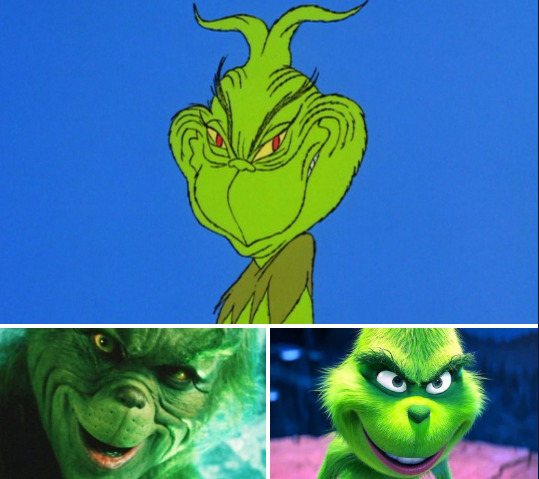
(WARNING! This analysis contains SPOILERS!)
What can be said about the Grinch that hasn’t already been said a million times by a million different people? The Grinch is easily one of the most iconic Christmas characters of all time, up there with the likes of Scrooge, and he even has a similar character arc in which he learns the true meaning of Christmas and becomes a better person. The original Chuck Jones animated short has gone down as one of the most beloved Christmas specials of all time as well as one of the best Dr. Seuss adaptations ever (if not THE best), and it gave the Grinch his iconic theme song which every other adaptation has seen fit to use.
The Jim Carrey live action take and the Illumination version which featured Benedict Cumberbatch in the title role both tried to bring a fresh take to the world’s most beloved classic Christmas curmudgeon, but did they succeed in making him entertaining and engaging as a villain is the real question?
Actor: In the original Chuck Jones short, none other than Frankenstein’s monster himself, Boris Karloff, portrayed the Grinch, but this is mostly due to the fact he was the narrator of the story and the Grinch is the only character who really speaks due to the tale being mostly shown from his POV. Still, let’s not pretend like Karloff isn’t the definitive voice here, especially considering his competition.
Carrey and Cumberbatch are both good actors, don’t get me wrong, but I don’t think they really do the Grinch all too much justice. Carrey, bless his heart, at least comes fairly close, with his Grinch being in line with the original, but at the same time this is a comedic Carrey character coming off of his 90s run as a wacky comic actor. Carrey injects that manic Carrey energy into the performance, and while I think it’s a good performance, I don’t necessarily find it to be a good Grinch,
Cumberbatch faces a similar issue, not helped by his decision to use a weird American accent as opposed to his natural British one, leaving his Grinch sounding like a nasally dork. Again, he doesn’t do a terrible job by any means, but his performance certainly does nothing to convince you the Grinch is a mean, rotten soul.
Motivation/Goals: The Chuck Jones Grinch sticks to the original book to a fault; the Grinch is just a cranky jerk who hates Christmas for some inexplicable reason, and so decides to ruin it for everyone out of petty spite. Yes, it lacks any sort of depth, but the Grinch is a character from a children’s book and he just puts so much darn effort into his plan that it’s really easy to forget he’s just doing this because he is just a miserable bastard.
The two other attempts at the Grinch have gone a long way to giving him some sort of tragic backstory explaining his hatred for Christmas. And… I actually really like that. Yes, yes, villains can just do villainous things because they’re jerks, but I do appreciate the other adaptations attempting to do something interesting with the character and make him a bit more engaging in a feature-length product. In the Jim Carrey film, the Grinch becomes bitter and evil due to a childhood of constant bullying, while the Benedict Cumberbatch Grinch was a lonely orphan who never got to celebrate Christmas. While obviously it’s up to the viewer to decide whether or not these backstories add any sort of interesting element to the Grinch’s hatred of Chrtistmas, it’s hard to deny that it makes a bit more sense than the Grinch suddenly and randomly deciding after half a century that this Christmas was going to be the last ever.
Personality: While this section of Psycho Analysis is going to be semi-retired, the three Grinches are actually a perfect example of where examining the personalities of the characters can actually show a lot about the overall quality. Obviously, the original Grinch is exactly what a Grinch should be, at least in my eyes: a bitter, miserable curmudgeon who takes great joy in bringing misery to others with his selfish, senseless acts of holiday thievery. He’s a mean one, Mr. Grinch.
The Carrey Grinch does still have these elements, but it’s a bit outshone by Carrey’s hammy performance. His Grinch is about as wild as Ace Ventura or the Riddler, and while hammy villains are always fun – and there’s no denying the Grinch is – it makes it a lot easier to see him eventually turning to the light side, especially since he’s actually shown to have some redeeming qualities.
These issues are continued into Cumberbatch’s Grinch, and in fact here the problems peak. Cumberbatch’s Grinch from the start comes off as more as mildly irritated jerk, yet one who really doesn’t seem evil at all, and as the story continues he seems far more like a depressed, unhappy man with undiagnosed mental illness who is suffering due to childhood trauma. You don’t want to say this guy has termites in his smile or that he’s slippery as an eel or that you wouldn’t touch him with a thirty-nine and a half foot pole; you just want to give him a hug and tell him that things are going to get better. He just seems like he needs a friend, not a total life-changing epiphany.
Final Fate: We all know how it goes; his heart grows three sizes and he learns the true meaning of Christmas. Each of the adaptations keeps this in, though obviously to diminishing returns as each successive adaptation has made the Grinch nicer from the get-go in some regard due to the tragic backstories and whatnot.
Best Scene: At least for the original, his best moment is, of course, the montage during “You’re a Mean One Mr. Grinch,” in which we get to see all of the slippery ways this green meanie is ruining the holidays. Of course, this is matched by the epic moment at the end where the Grinch gains super strength from his heart growing three sizes and lifts the sleigh of stolen goods, which is equally awesome whether it’s te animated one or Jim Carrey doing it.
Cumberbatch’s Grinch manages to have a different moment to call his best: after he has redeemed himself, he gets invited to dinner in Whoville, and the scene where he nervously goes to the house and makes small talk is just very sweet and endearing. It’s easily the best scene in the movie and shows that even watered down there’s still plenty of heart to be mined from this timeless tale.
Final Thoughts & Score: I think that the fact that the Grinch is constantly being reimagined is a sign at how impressive and enduring he is as a character, and he’s easily the greatest Christmas villain of all time (with apologies to Hans Gruber, Mr. Potter, Burgermeister Meisterburger, and Kirk Cameron). The original special is obviously the definitive portrayal of the character, to the point where the Grinch became a household name and got himself two more specials, one in which he once again terrorized Whoville (this time with a wagon filled with nightmarish hallucinations) and one where he faced off against the Cat in the Hat, the latter being especially notable for beating Zack Snyder to the punch at making “Crossover Versus Movie in Which One of the Title Characters Is Redeemed By Mentioning His Mother” by 34 years.
The original Grinch even effected himself; his iconic green, almost goblin-like appearance was a departure from the book, where he sort of resembled a more mischievous Who, and it has ended up sticking for the character ever since. Throw in that iconic villain song about how foul he is sang by Thurl Ravenscroft AKA Tony the Tiger, as well as the fact that “Grinch” is up there with “Scrooge” as shorthand for someone who hates Christmas, and it’s easy to justify letting the Chuck Jones take on the Grinch steal not only Christmas, but an 11/10.
Carrey’s take on the character is different, but not bad. I’m not going to say it’s good either, though; I still think Carrey hammed it up too much and just let loose his manic energy. And it’s really weird, because I have a soft spot for the film and I love the performance, and I think the insane energy of Carrey’s performance is what elevates the film and has helped it become a sort of holiday cult classic, but I think that it kind of misses the point of how the Grinch should be. It really boils down to the usual thing with these adaptations that try and add complexities to characters that just work better when they are simple: Jim Carrey’s Grinch is a great, fun character, but he just isn’t a great Grinch. Still, the makeup and costuming is so amazing that I’d feel like a Grinch myself if I stole too many points, so I think a 6/10 is a solid score for a performance that manages to be a bit above your average villain.
And then we get to Cumberbatch. I’m just going to say it: I barely consider his Grinch a villain. He’s just too nice and sad and cranky to really be evil. Sure he has wacky inventions, sure he is a bit passive aggressive to the Whos, but god this guy is just not mean enough. The fact he can just walk into town and interact with the townsfolk and they don’t even bat an eye says a lot about how watered down and toothless this take on the character is. Not helping is the safe, soft design Illumination gave him, as well as Cumberbatch’s weird American accent. Still, I don’t think this Grinch deserves worse than a 4/10 when it comes right down to it. In this case, it’s more that what’s interesting about him as a character saves him from sinking any lower than just being subpar as opposed to the problem with Carrey being that what made him interesting as a character made him less appealing as a Grinch. This guy does still try and steal Christmas, after all… It’s just that he’s so nice to begin with that you really aren’t too shocked when he does end up turning over a new leaf.
While it’s obvious the Grinch has had his ups and downs over the years, the fact he is such a legendary figure and an enduring cultural icon really says a lot for his staying power, as well as that sometimes a simple villain that lacks any complex motivation beyond “he’s a jerk” can really resonate with people. Maybe all of these other adaptations don’t quite measure up to the original animated special, but they don’t need to; it’s just interesting to see what different visions for the Grinch look like from different creators. Whether it’s good or bad, one thing is for sure: he’s a mean one, that Mr. Grinch, and we all love him for it.
You know what we don’t love him for, though? His dental hygiene.

Merry Christmas!
#Psycho Analysis#The Grinch#how the grinch stole christmas#Dr. Seuss#Chuck Jones#Boris Karloff#Jim Carrey#Benedict Cumberbatch
26 notes
·
View notes